|
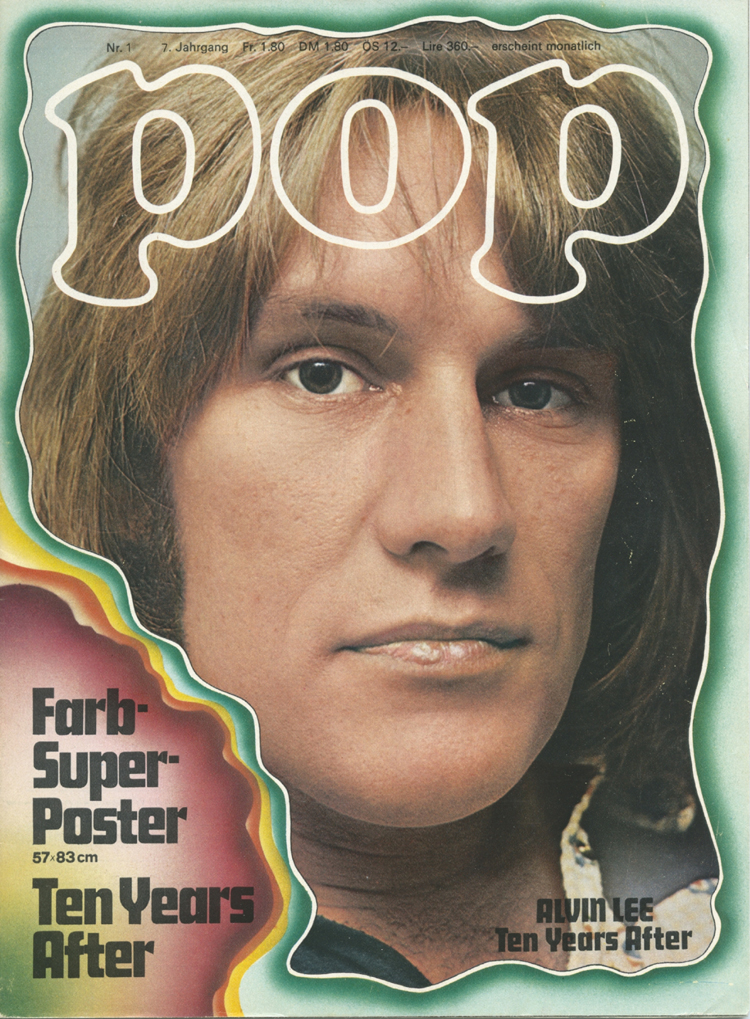
POP No. 1, Magazine from Switzerland,
(also published in
Germany)
- Contribution
by Marcel Aeby -
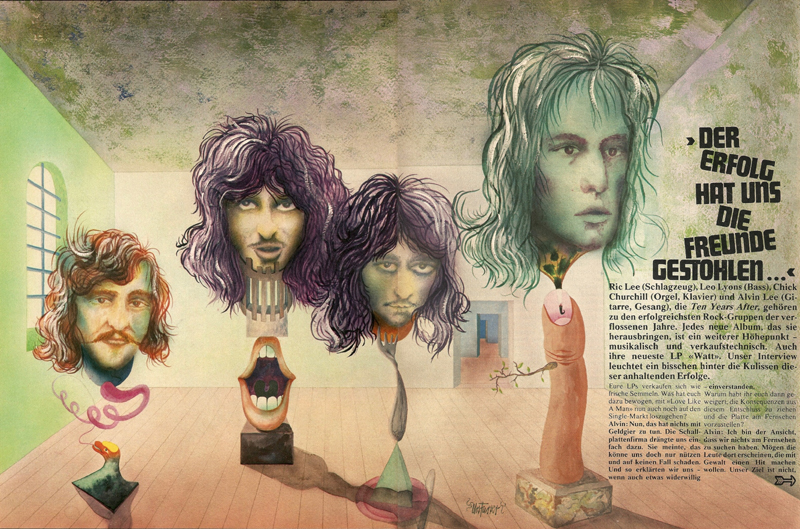
Farb-Super-Poster - Painting by Urs Furrer
- Page 4 & 5
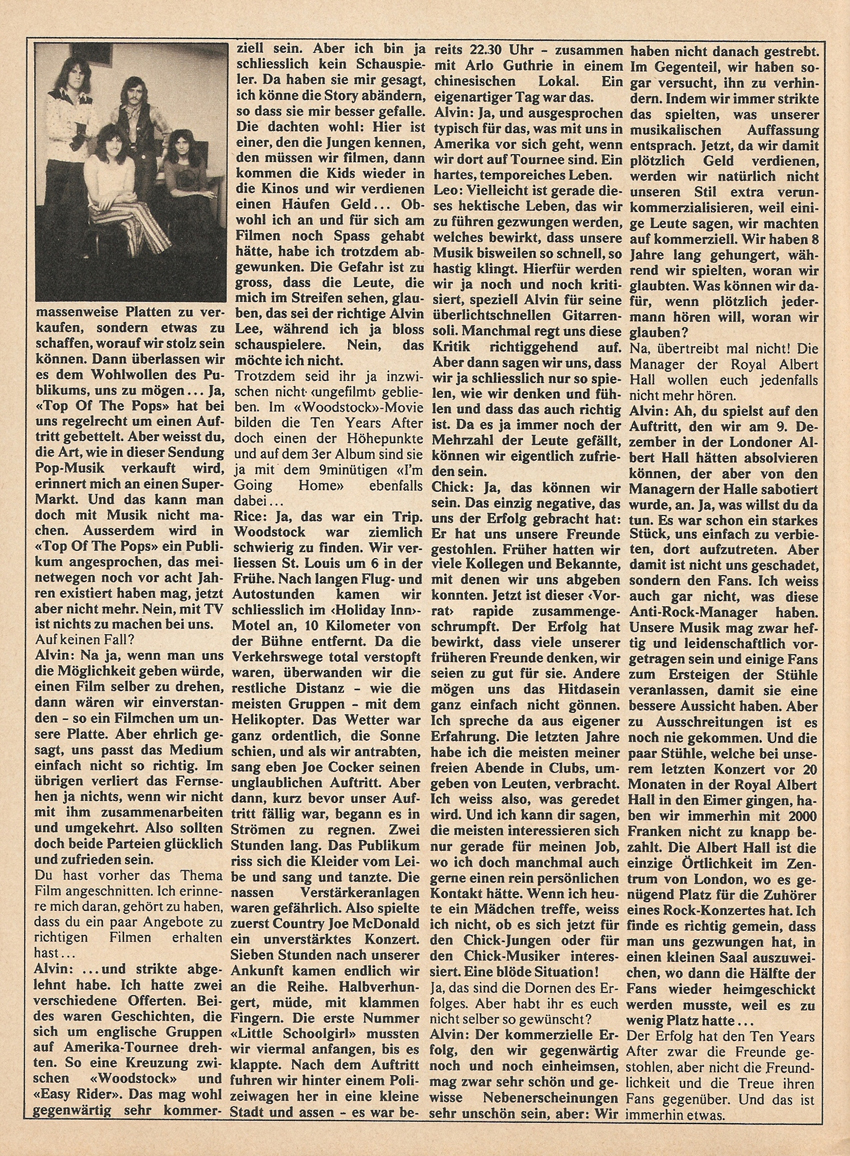
page 6
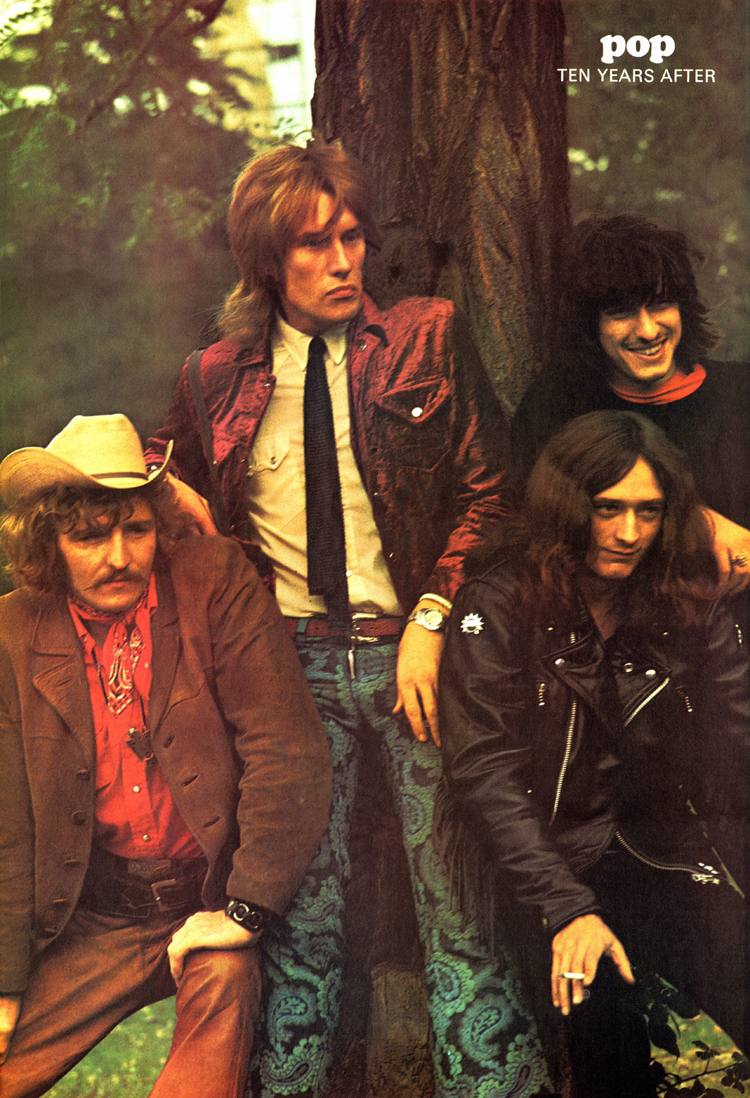
POP Magazine, No. 1, January 1971
- published in Switzerland - Poster (1969)
- Contribution
by Marcel Aeby -
The following anticle in
German about the newly released "WATT" album,
released 10 December 1970
Ten Years After – “Watt”
WHAT is WATT – is
the question? Watt is the sound of the wheels starting to
seize up on Ten Years After. It was their fourth album
within eighteen months of their career-defining moment at
the 1969 Woodstock Festival and the supply of riffs that
had propelled them to the sharp end of the British heavy
blues rock brigade was running out. There’s a sense that
they need to broaden out, but have no real idea of how or
where. The last couple of riffs are used up on the opening
“I’m Coming On” and “My Baby Left Me”. After that they’re
winging it – although Alvin Lee drops some hints on the
acoustic ballad “Think About The Times”.
By the end they’re
reduced to adding another Woodstock track as a makeweight.
By Hugh Fielder – four stars cold. (The other live track
that Mr. Fielder is talking about is not from Woodstock at
all, it’s from the Isle of Wight Festival 1970, and stuck
on the end of the WATT album).
|
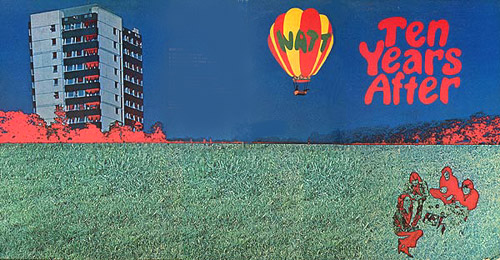
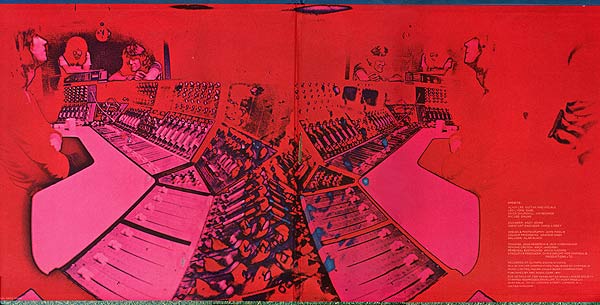
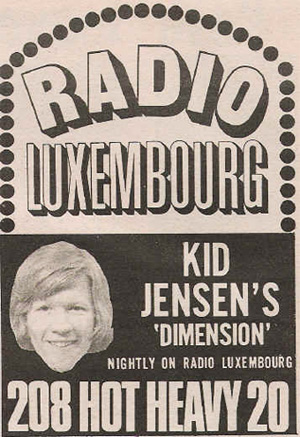
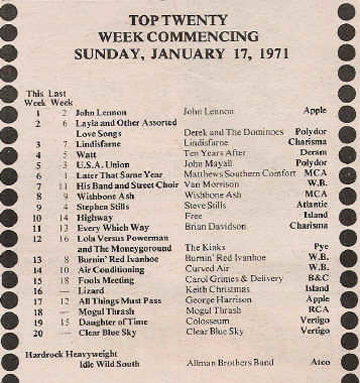
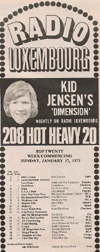
TOP
TWENTY Chart - The WATT Album going up with a
bullet !
|
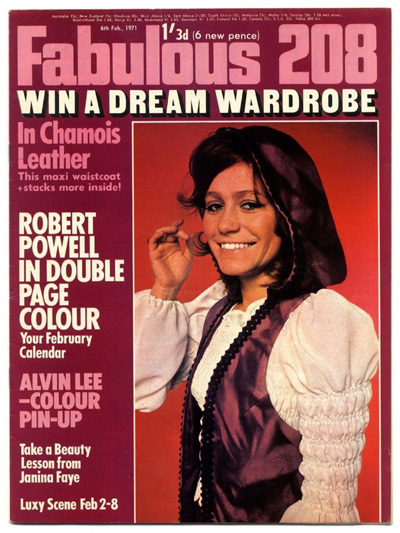
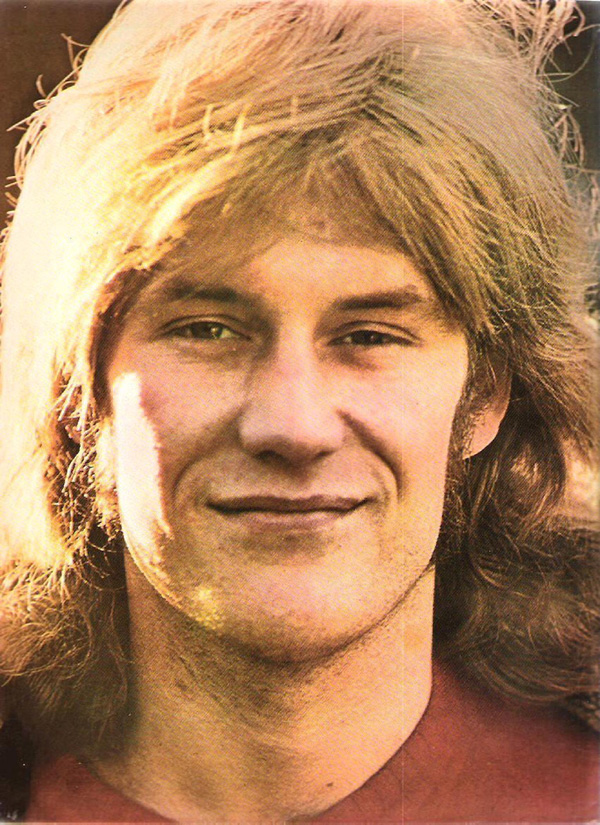
Fabulous
208 Magazine - 6 February 1971
February 20, 1971
Sounds
Ten Years After must be
seen
TEN
YEARS AFTER are a band who've made it on the strength
of their live appearances. It's on stage, playing
supercharged rock 'n roll that they've made their name,
coming across with a power that only a few groups can
equal.
Stage appearance
have always been vital to the group and festivals have
played a major part in their success since they first
reached a large audience at the 1967 Windsor Jazz
Festival which they followed with a residency at the
Marquee where they built a huge following.
After their
festival debut, the group recorded a first album and
in the summer of the following year they made their
first tour of America.
They played with
Canned Heat at Bill Graham's Fillmore West and Graham,
certainly one of the most influential powers in the
American rock scene, booked them to open his new
Fillmore East in New York with Butterfield Blues Band.
The American
reaction to the group was so strong that they suddenly
found themselves one of the most popular British
groups to tour the States only a little while after
they'd first come to London from Nottingham where they
started.
Individually, the
members of Ten Years After -- Alvin lee, Leo Lyons,
Ric Lee and Chick
Churchill
- had been playing around the Nottingham area for a
number of years although Leo and Alvin played together
in various groups at one time.
As Ten Years After
the group has been together for nearly four years.
They had, however, been working under other names -
like the Jaybirds - for nearly two years before that.
Organist Chick Churchill
being the last member to join.
|
|
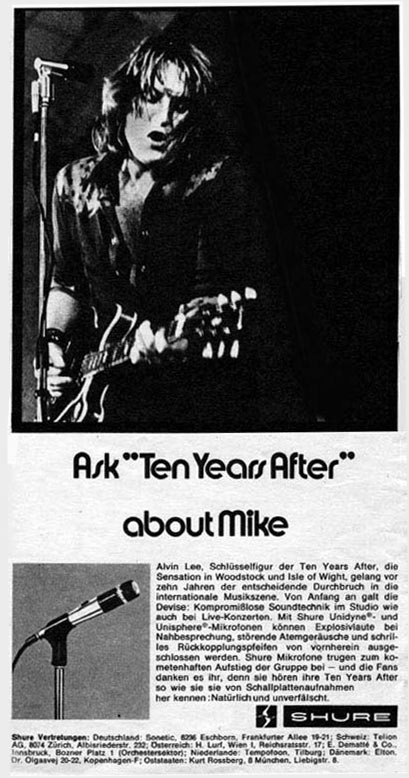 |
To date the group
has made a total of eight tours of America. They
returned to the Fillmore East to appear with Janis
Joplin and have in fact spent over half of their time
together working in the States where they are an
enormous drawer capable of filling 6,000 capacity
halls with thousands left outside.
The summer of 1969 proved to be another turning point
in the group's history. It was the year they appeared
at nearly all the major festivals including
"Woodstock", which attracted half a million
people and some of the best rock groups in the world.
The music that Ten Years After play is a contemporary
mixture of blues, rock and roll and jazz that is
definitely their own. Their music varies from a souped
up jazzy version of Woody Herman's "Woodchopper's
Ball", which became the stand out number of their
Marquee stage act, to a wild, rocking version of
"Good Morning Little Schoolgirl"
Its one of the
strangest things about the group that none of their
six albums - "Ten Years After", "Stonedhenge",
"Sssh", :Undead" Cricklewood
Green" and "Watt" - have come close
to capturing quite what Ten Years After are all about.
Their records are good but nothing like their stage
appearances.
As a group they're
at their best when they're working on stage, they
drive each other, working, moving and playing
seventies rock and roll with a force and excitement
that is impossible to ignore. - ROYSTON ELDRIDGE
|
|
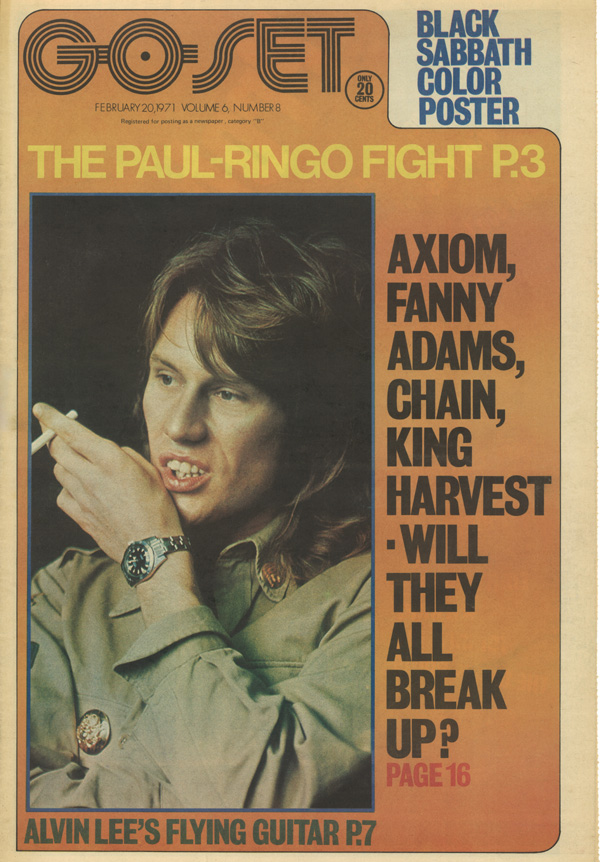
20
February, 1971 - GO-SET newspaper, front page,
Australia
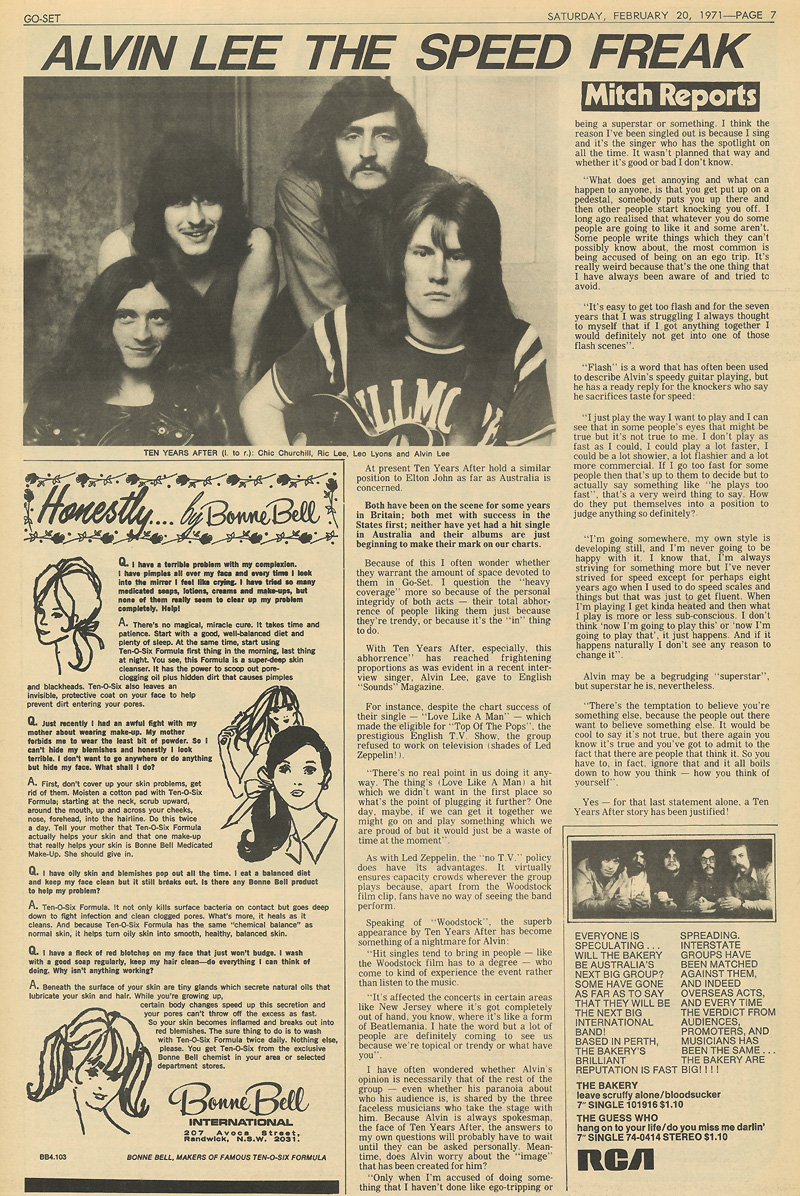
20
February, 1971 - GO-SET newspaper, page 7, Australia
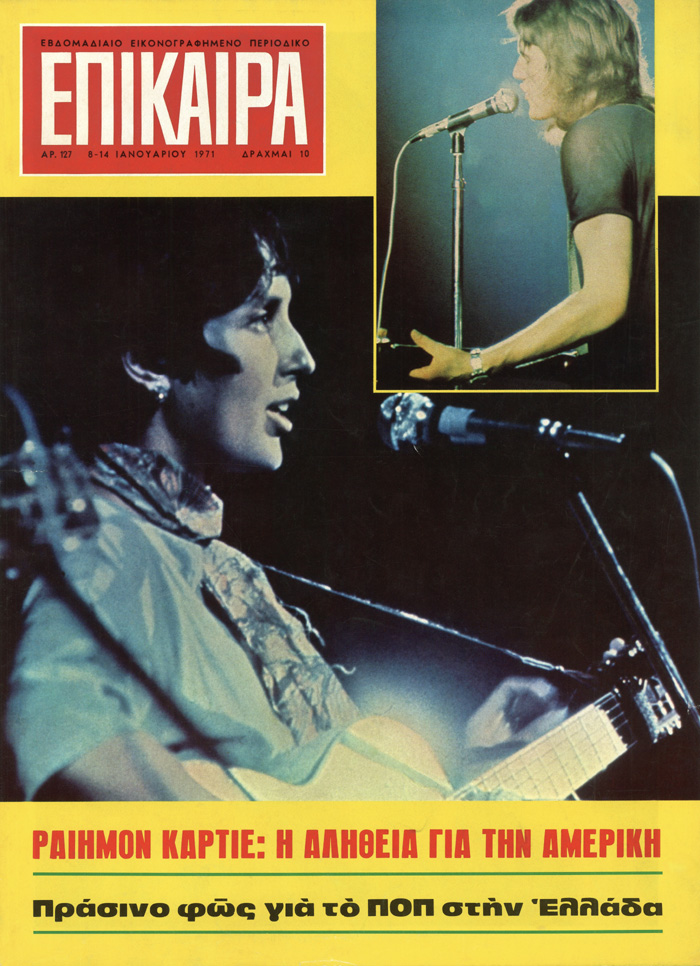
1971, "ENIKAIPA"
Magazine, Greece, front page
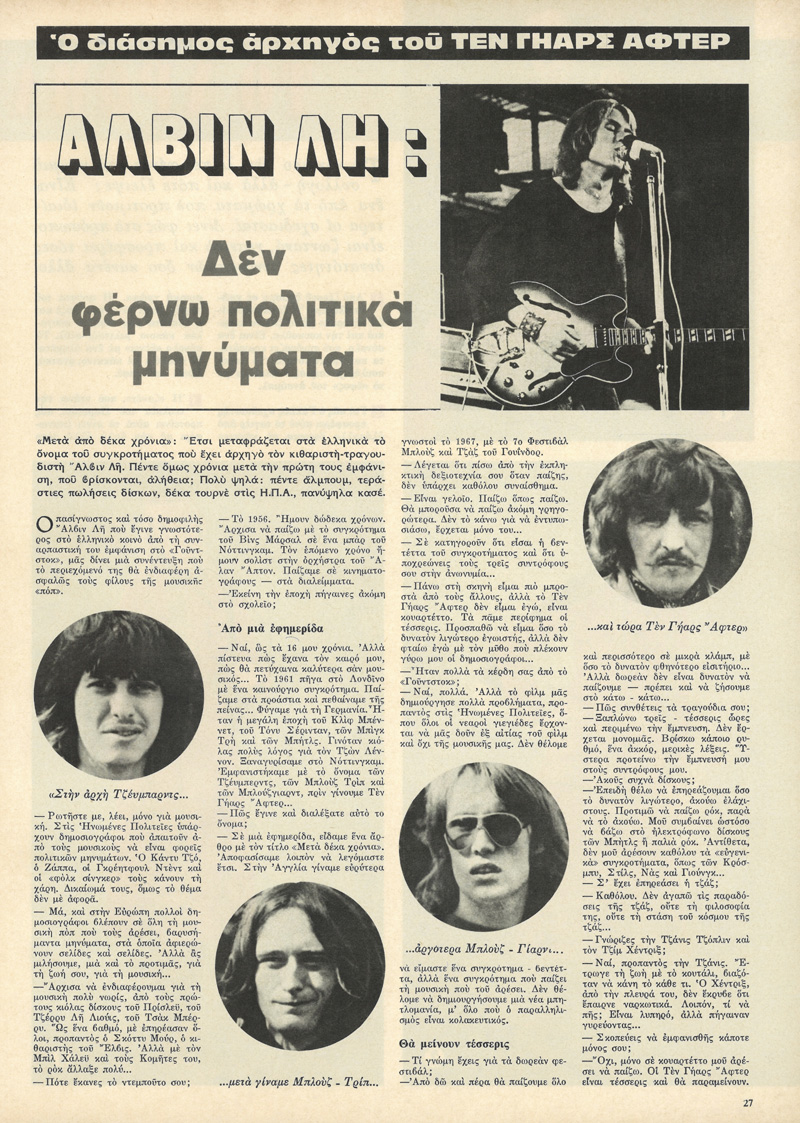
Greece
Magazine "ENIKAIPA", page 27
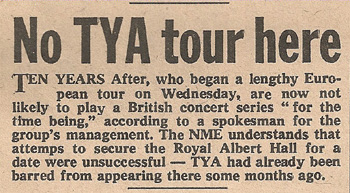
New
Musical Express February 27, 1971
(Saturday)

28
February, 1971 - Ernst Merck Halle, Hamburg
- Concert Poster
|
February 27,
1971
Ten Years
After concert at KB Hallen Copenhagen, Denmark
March 2,
1971 - Deutschland Halle, Berlin, Germany
Set List: Love
Like A Man – No Title – Once There Was A Time – Slow
Blues In C – Hobbit One Of These Days – You’re Walking
Around With Your Head In The Sky – I’m Going Home
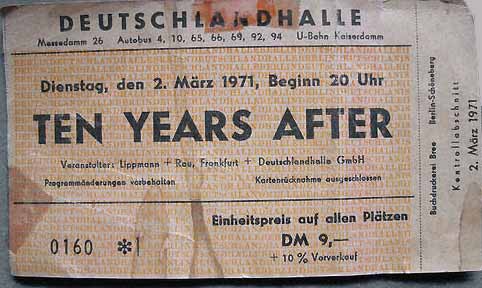
|
5
March 1971 - Ten Years After at
Circus Krone, München, Germany
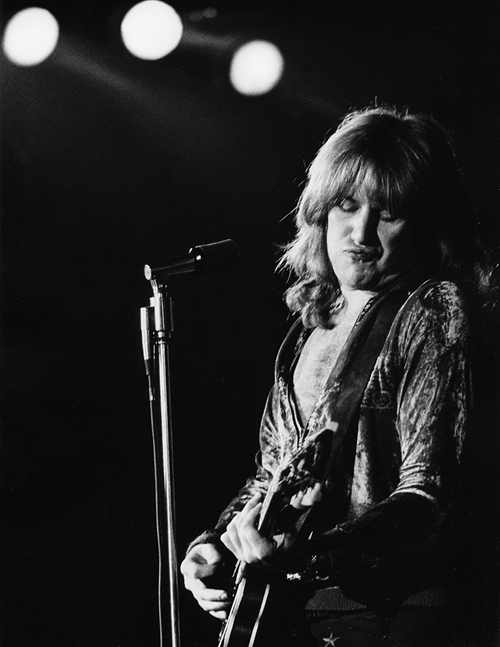
Ten Years After at Circus
Krone, München 1971 - Photos by Ulli Schwenn
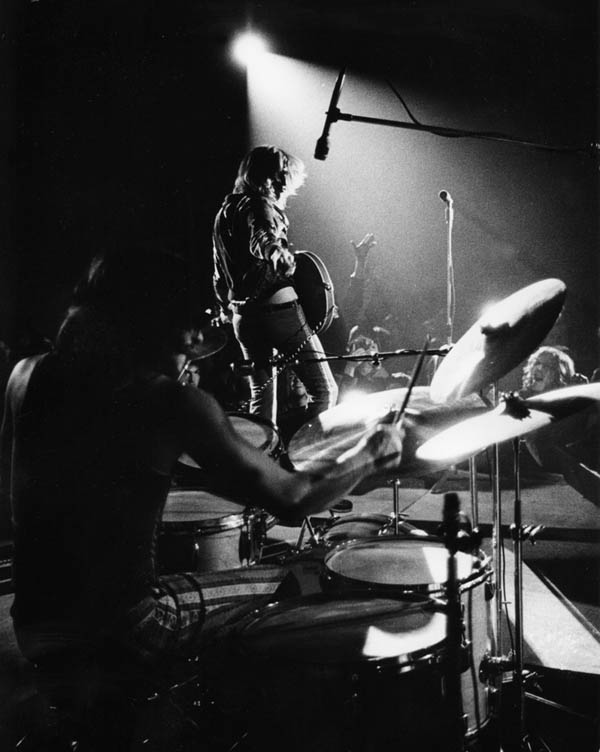
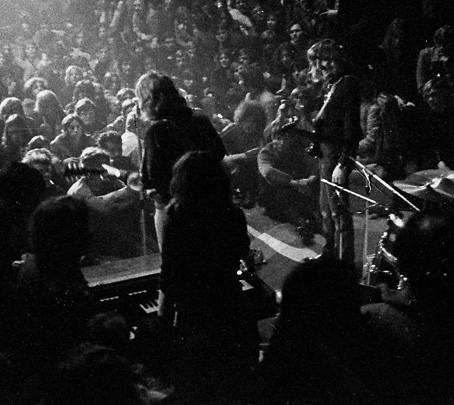
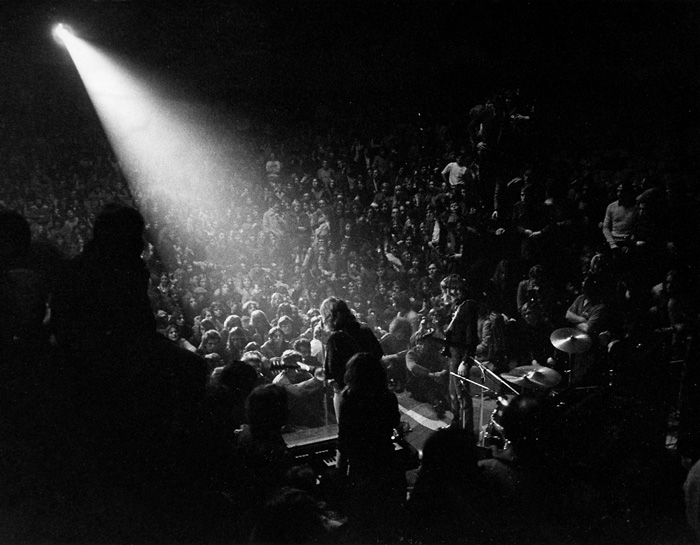
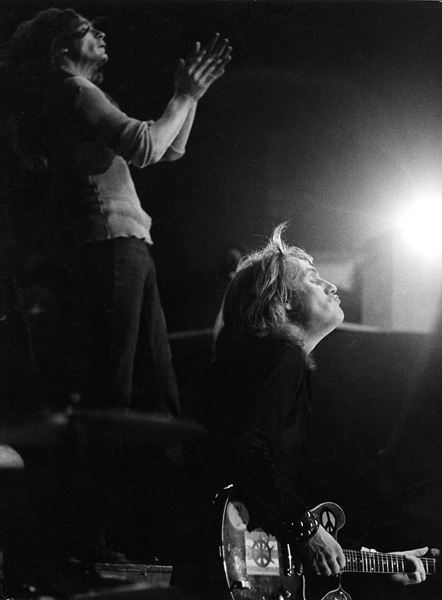
|
Ten Years After at Circus
Krone – München, Germany
Set List:
Love
Like A Man – No Title – Once There Was A Time –
Slow Blues In C – Hobbit - One Of These Days
She
Lies In The Morning – I’m Going Home – Sweet
Little Sixteen |
Below:
Most likely taken on the
10th in Strasbourg, or on the 24th in Brussels
- page from a French Magazine -
name and issue unknown
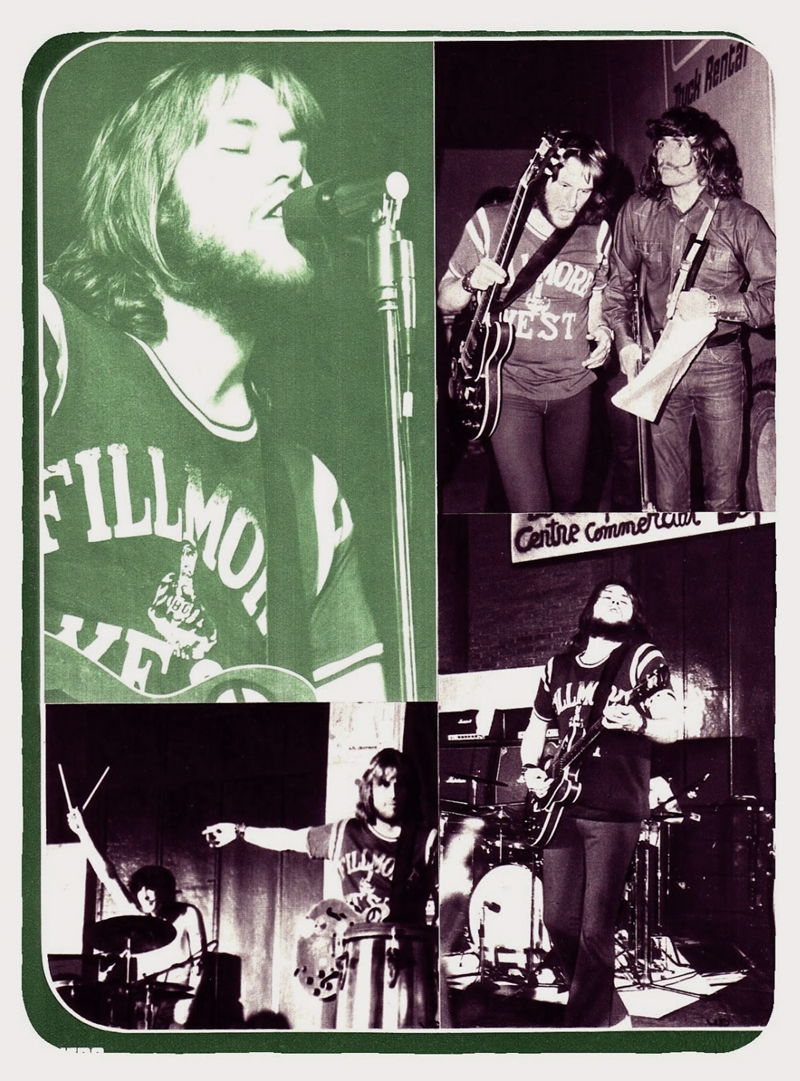
Sounds
Magazine - March 20, 1971

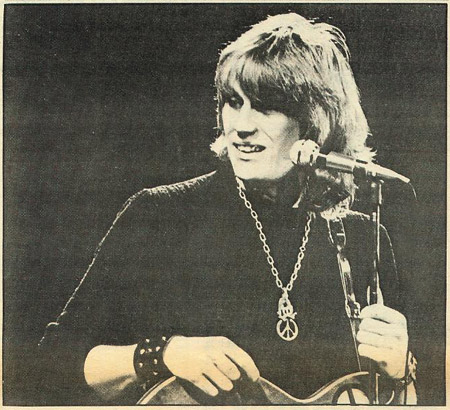
The
Kroneball Circus is the premier entertainment venue
in Munich. It is a permanent big top, circular and
saw-dusted, and Ten Years After played there after
the clowns had taken off their make-up and the
elephants had been put back in their cages.
There
was a change in audience. The older people and the
very young had gone home, and they had been replaced
by Munich’s rock audience, some of whom might have
remembered the Beatles playing there years before.
It
was an audience that should have seen the result of
Ten Years After’s three-month lay off. A break
from live performances which Alvin Lee says has
given the group a chance to recharge their musical
batteries and to look at the direction in which they
are travelling.
Munich
didn’t see it though. As a gig it was in manager
Chris Wright’s words, a bummer. By far the worst
of the tour and there was very little the group
could do about it, because it had gone wrong before
they even got there.
It’s
a cold city, Munich, colder than Moscow that night
and in Red Square, it was eight degrees below
freezing, and at the Kroneball Circus when the group
arrived, there was even more of a chill in the air.
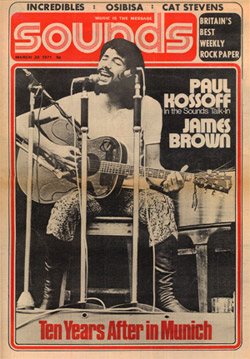
Mick
Abraham’s band should have started the rock show
at midnight, an hour after the last clown
cart-wheeled out of the ring, but there were delays.
The circus was late in finishing and the equipment
was held up in transit from Vienna, the last stop,
because of the snow on the roads. And when it
arrived there were further problems. The audience, a
complete 3,000 sell-out capacity, had been let in
early because of the cold and they had come in so
quickly that no one left room for a stage. “There
was no stage, there wasn’t any backstage area, it
was just kids,” Chris Wright explained. When the
group got there, there still wasn’t a stage, just
a little space out front with hardly enough room for
the group to get on, let alone their equipment.
And,
the audience were getting a little restless, a
little violent, even as the time moved on, and Mick
Abraham’s came back to the safety of the hotel. It
was one of those situations that was beginning to
get nasty.
Ten
Years After decided to play, a decision that
prevented a certain riot, but there were cars back
stage ready for a speedy get-away if the situation
got worse. By this time, it was nearly three in the
morning and Mick Abrahams band were ensconced in the
hotel, it was too late for them to go on, and for
bass player Pete Fensome, it was rather a wasted
journey that day. He had flown out that evening to
deputise for Walter Monoghan who had come back to
Britain to get married. He didn’t play the next
day either because of other delays.
Andy
Jaworski, Ten Years After’s road manager, had
managed to organize half of the groups amplification
on stage, and on they went. They served up “Love
Like A Man” for openers and the audience thawed.
Because of the amplification problems, Chick
Churchill’s organ and some of Alvin Lee’s vocals
were lost somewhere up in the roof of the big-top,
but the group hammered home. A lot of the new
numbers had to go by the wayside. German audiences
only seem to like music to rock to anyway, and Ten
Years After were getting through to them.
Technically
they suffered. If the amplification and the lack of
stage room wasn’t enough, drummer Ric Lee and
organist Chick Churchill had to sign autographs
during the set, which isn’t the best way of
keeping everything together, but they did. A new
blues number came over well, as did the bass guitar
work of Leo Lyons, and one guitar solo from Alvin
who used the microphone stand for added effect. A
little piece of rock and roll was the encore and Ten
Years After sent the audience out into
the snow a lot warmer than they had been
before.
The
Kronball Circus for all of its disadvantages on that
night, does permit rock concerts and that’s more
than can be said about some venues back in warmer
England. Ten Years After won’t tour here until
they can get a London concert and that doesn’t
look too likely at the moment. Maybe Billy Smart
could help…
|
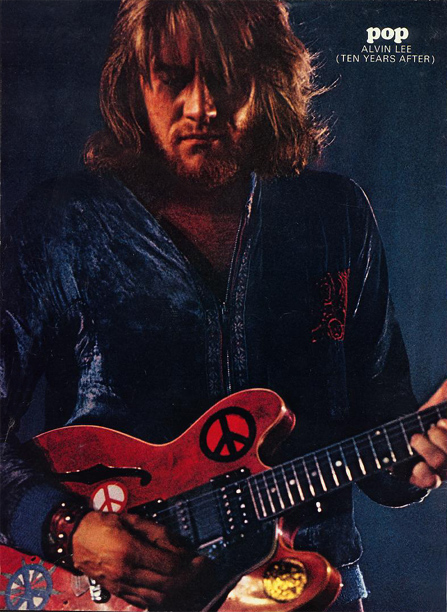
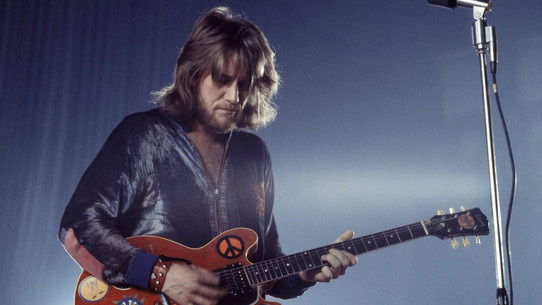
|
TEN
YEARS AFTER Tour in Germany - Düsseldorf, 6 March 1971
Pictures by Hans Hübner - Courtesy of B.
Scholz
|
|
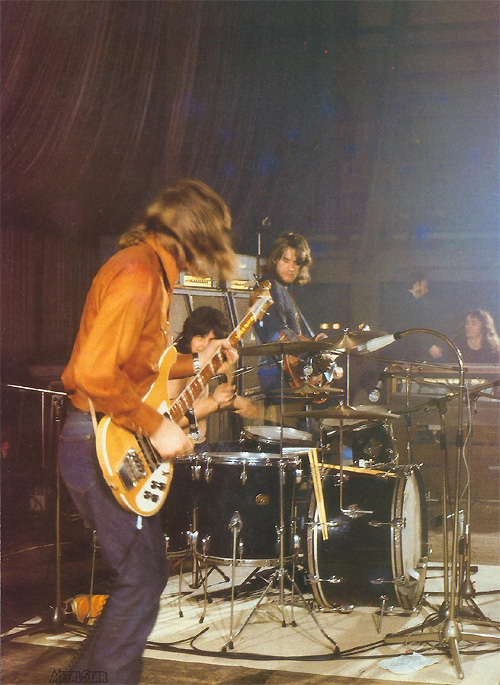
This
Photo from METAL STAR Magazine
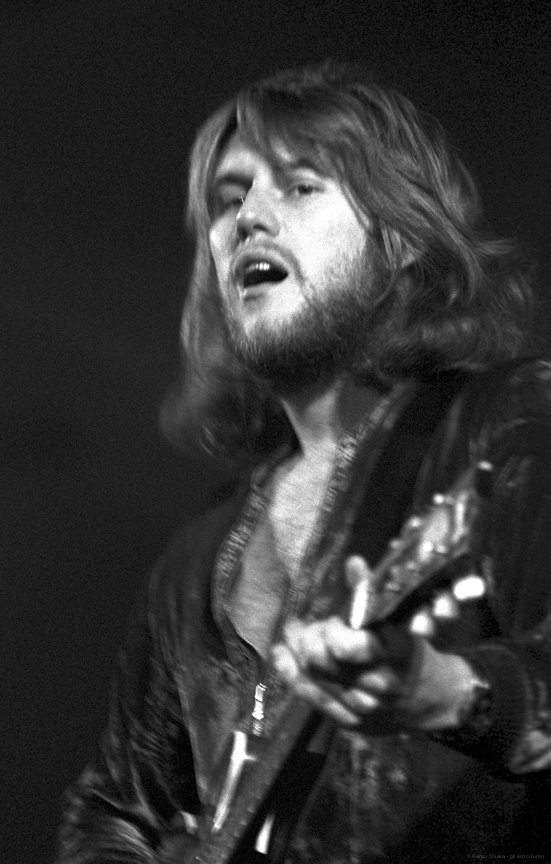
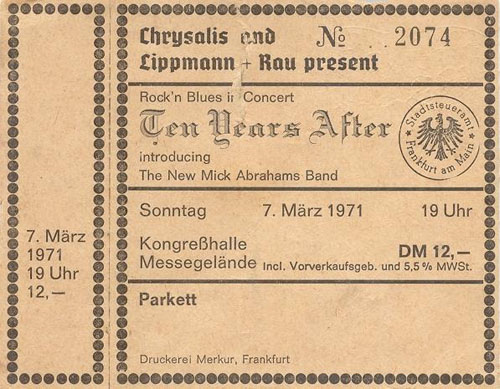
|
|
March 13, 1971 - Record Mirror
Magazine

Richard
Crowley is one of the mainstays of the Chrysalis
Agency who exclusively represents:
Black Sabbath,
Black Widow, Blodwyn Pig, Chicken Shack, Clouds,
Curved Air, Family, Freedom, Groundhogs, Howl, Jethro
Tull, King Crimson, Mick Abrahams Band, Principal
Edwards Magic Theatre, Savoy Brown, Steeleye Span,
Supertramp, T.Rex, Ten Years
After, Tir-Na-Nog, Writing On The Wall and Yes.
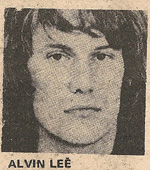
Their
currently successful Black Sabbath concert tour opened
in Birmingham, but had no London venue, as the
management of the Albert Hall did not wish the group
to appear there.
Outlets for
major tours in London, may be a big problem in the
near future.
“It’s very important that we find a venue
in London, purely and simply for promoting Rock
Concerts or current pop attractions. Something on the
same line as Bill Graham’s Fillmore East in New York
City, where there are no problems about the kids
having a good time. A major problem is that the
management of most major halls, I believe are
frightened of the audiences and I feel that it is very
important to present these artists in London, in a
venue where there are absolutely no restrictions.
“Over the last
four or five years the business has changed. In every
major town and city there used to be at least two or
three Rock Clubs, booking artists. Now there are very
few, hardly any clubs around and as regards to work
the artists have had to look to America and Europe. This is one of
the major reasons why there is a scarcity of major
artists appearing in England.
“The
University Scene, is extremely healthy, but the
problem with clubs is very serious, as there is
nowhere to promote new artists and groups. “In 1971
the pop scene appears very stale, where as a few years
ago the whole scene changed from Soul / Motown to
Blues, Rock, Progressive Rock. There seems to be a
trend toward lighter music with artists like James
Taylor (Apple Records), Neil Young (Harvest / Reprise
Records) and Elton John (MCA Records). On the other
hand, there is still a strong market for Led Zeppelin,
Ten Years After, Black Sabbath,
and the heavier bands who are already established. But
I can’t envision any new heavy Rock Bands coming up
and making it”.
By Richard Cowley |
|
March 13, 1971
-
New Musical Express
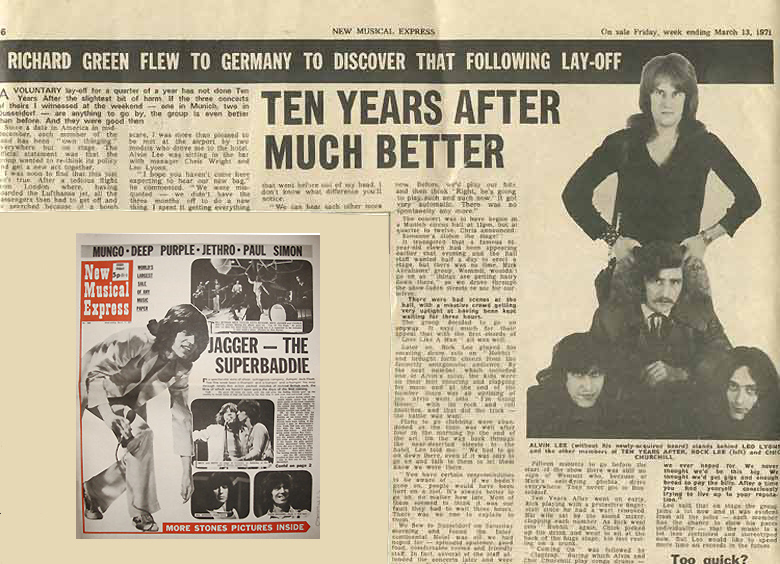
TEN YEARS AFTER MUCH
BETTER:
A Voluntary lay off for a
quarter of a year has not done Ten Years After the
slightest bit of harm. If the three concerts of theirs
I witnessed at the weekend---one in Munich, two in
Dusseldorf--are anything to go by, the group is even
better than before, and they were good then...
Since a date in America in
mid-December, each member of the band has been "own
thinging" everywhere but on stage. The official
statement was that the group wanted to re-think its
policy and get a new act together. I was soon to find
that this just isn't true. After a tedious flight from
London where, having boarded the Lufthansa jet, all
the passengers then had to get off and be searched
because of a bomb scare, I was more than pleased to be
met at the airport by two models who drove me to the
hotel.
Alvin Lee was sitting in
the bar with manager Chris Wright and Leo Lyons.
"I hope you haven't come here expecting to hear
our new bag" he commented. "We were
misquoted, we didn't have the three months off to do a
new thing, I spent it getting everything that went on
before out of my head, I don't know what difference
you'll notice. " We can hear each other more now,
before we'd play our hits and then think 'right he's
going to play such and such now.' It got very
automatic, there was no spontaneity any more".
The concert was to have
begun in a Munich circus hall at 11:00 pm but at
quarter to twelve, Chris announced: "Someone's
stolen the stage!" It transpired that a famous 95
year-old clown had been appearing earlier that evening
and the hall staff wanted half a day to erect a stage,
but there was no time. Mick Abrahams group, Wommit,
wouldn't go on as "things are getting hairy down
there," so we drove through the snow-laden
streets to see for ourselves.
There were bad scenes at
the hall, with a massive crowd getting very uptight at
having been kept waiting for three hours.The group
decided to go on anyway. It says much for their appeal
that with the first chords of "Love Like A
Man" all was well.
Later on Ric Lee played
his amazing drum solo on "Hobbit" and
brought forth cheers from the formerly antagonistic
audience. By the next number, which included one of
Alvin's solos, the kids were on their feet cheering
and clapping for more and at the end of the number
there was an uprising of joy. Alvin went into
"I'm Going Home," with its rock and roll
snatches, and that did the trick, the battle was won!
Plans to go clubbing were
abandoned as the time was well after four in the
morning by the end of the act. On the way back through
the near-deserted streets to the hotel, Leo told
me: "We had to go on down there, even if it was
only to go on and talk to them to let them know we
were there. "You have certain responsibilities to
be aware of....if we hadn't gone on, people would have
been hurt on a riot.It's always better to go on, no
matter how late. Most of them seemed to think it was
our fault they had to wait three hours, there was no
one to explain to them."
We flew to Dusseldorf on
Saturday morning and found the Inter-continental Hotel
was all we had hoped for--splended opulence, good food, comfortable rooms and friendly
staff. In fact
several of the staff attended the concerts later and
were very complimentary the next morning.
The Dusseldorf dressing
room was as grand as the Munich one had been miniscule.
Suddenly the air was rent with the yell "Silence"
stopping the incessant chatter. This, it seems is
standard procedure when Alvin tunes up, because he
does so by listening acoustically to Leo's bass
through the end of the neck. Fifteen minutes to go
before the start of the show there was still no sign
of Wommit who,because of Mick's anti-flying phobia,
drive everywhere. They never got to Dusseldorf.
Ten Years Afterwent on early, Ric playing with
protective finger-stall since he had a wart removed.
His wife sat by the sound mixer, clapping each number.
As Ric went into "Hobbit" again Chick picked
up his drink and went to sit at the back of the huge
stage, his feet resting on a trunk.
"Coming On" was
followed by "Claptrap." during which Alvin
and Chick Churchill play conga drums, it's a new
number with loads of oomph and went down extremely
well.
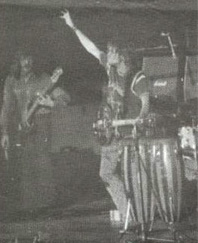
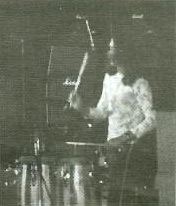
Alvin's announcement,
"this is I'm Going Home" was the signal for
everyone to stand up and stamp, a few getting on to
the stage. At this point the house lights went on and
remained glaring until the start of the next show.
There were the inevitable demon bootleggers with their
tape recorders and mikes on make-shift booms in the
sixth and seventh rows, and the equally inevitable
encore of "Sweet Little Sixteen" which
rocked in true fifties style.
Back in the dressing room.
I complimented drummer Ric on his solo and he replied:
"I don't like making solos too long, they get
boring unless you're Buddy Rich and I'm not! That's
why I don't like Ginger Baker, his solos are always
too long, they go on and on. "I liked it out
there tonight though, sometimes you can just go on and
play, tonight the spark was there".
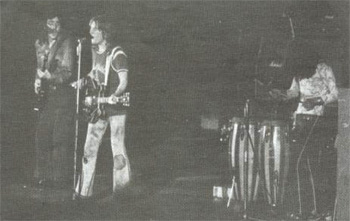
Some bright idiot decided
to lead a communal singing of "Robin
Hood" because of my name being the same as the
film actor's, then Roadie John announced "I've
got five birds outside, can I bring them in? Not to be
outdone, Roadie Jack proclaimed: "I've got a
crate of beer here if anyone wants any."
While Chick, who had
blisters on his hands through not playing for so long
taped up his thumb, Leo spoke about the break in their
activities, "I live in the country I've got
horses so there was plenty for me to do," Leo
revealed, "I've spent a lot of time thinking
about what the group would like to do, whether to go
out doing a lot of concerts and taking the money or
record more, or what. "You start playing because
you enjoy it and don't give a darn about the audience
and after a time it becomes so you get your enjoyment
from your audience, it's like putting the cart before
the horse. Now it's getting back to the way it used to
be....We've gone way beyond what we ever hoped for, we
never thought we'd be this big, we thought we'd get
gigs and enough bread to pay the bills, after a time
you find yourself consciously trying to live up to
your reputation." About recording Leo says:
" We spend three weeks on an album and that's it,
it's over and done with" he confessed, "some
groups, even new ones take months over it, I think we
ought to take more time out for recording, we've done
six albums and about sixty thousand gigs, the trouble
is we're lazy......He didn't get a chance to finish as
Alvin yelled good naturedly across the room "who's
lazy? I'm not lazy."
Chick crept off to bed and left the
rest of us to find Lovers Club on our own.
Before the group drove off to
Frankfurt the following afternoon, we gathered in
the restaurant to catch up on the football results
and discuss of all things the Industrial Relations
Bill with which Chick is in full agreement. When the
coach arrived to cart them away, they finished
their orange juices and shook hands with me. "Try
to make it to Rome at the end of the tour, we'll
need someone to keep the lions at bay," cracked
Chick as he drove off
|
|
March 13, 1971 - Montreux
Poster - contribution by Christoph Müller
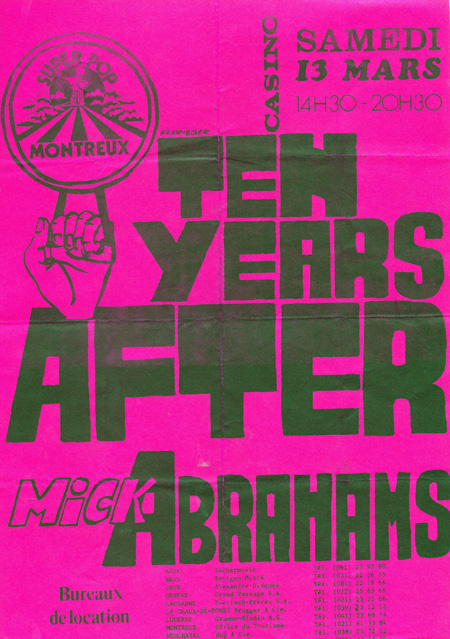
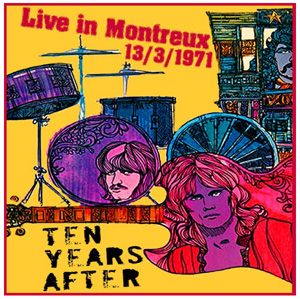
March 15, 1971
Ten Years
After at Palalido, Milan, Italy
Article from IL CORRIERE DELLA SERA kindly
contributed by Jack Skelly
|
.JPG)
(Thank you Jack for
this great contribution - and many thanks to
Alessandro for sending it to us) |
March 17, 1971
Ten Years
After at Pala Europa – Rome, Italy
"L'Avanti", March 17, 1971
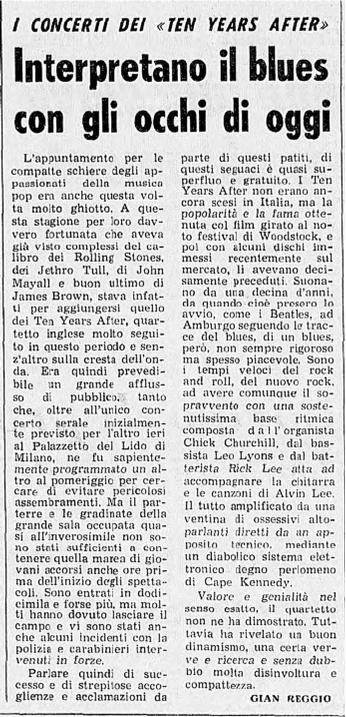
March 18, 1971 (above
and below contributed by Alessandro B :)
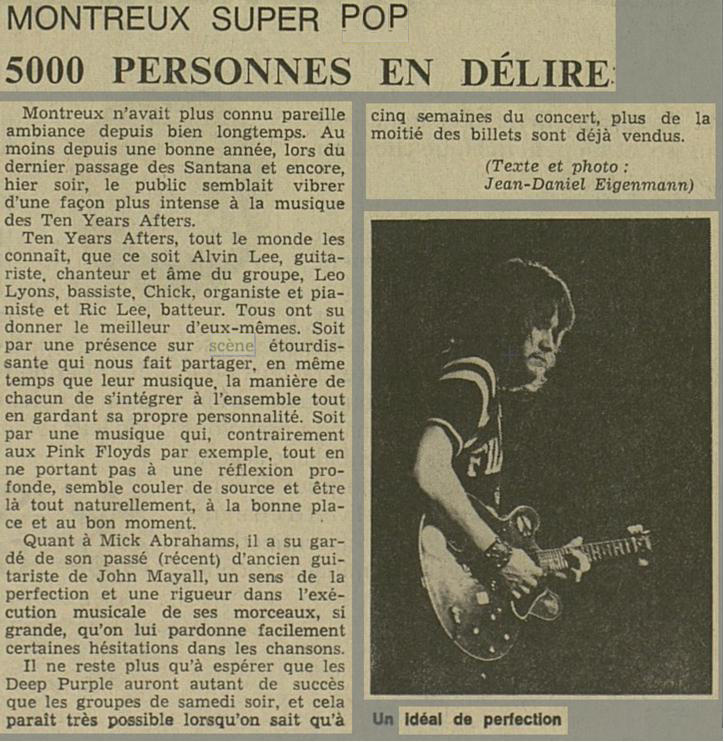
|

March 1971
|

March
1971 - GO Magazine, No. 27, Sweden - front page
Photo: Jorgen Angel (taken in 1969)

page 2 -
Photo: Jorgen Angel
|
1971 Album Release: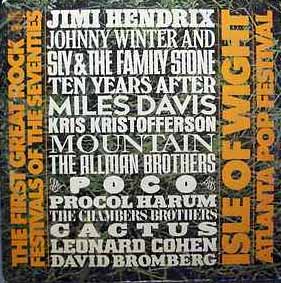
The First Great
Rock Festivals of the Seventies:
ISLE OF WIGHT -
ATLANTA POP FESTIVAL
The Isle Of Wight /
The Atlanta Pop Festival – Three Record Set – Review:
No doubt released
to capitalize on the success of the Woodstock three record
set, but no where as good in editing or in performance.
That being said, I personally have a strong affection for
this set of performances. Two of the three disc in this
collection were recorded at the Isle of Wight Festival and
the other disc was recorded at the Atlanta Pop Festival,
both in 1970. When I first purchased it (at a bargain price
– as I remember), and got it home, it was Ten Years After
that I was interested in most of all. Then came Leslie West
and Mountain, Cactus, Johnny Winter, Jimi Hendrix, and all
the others followed. Some music on here, I only set the
needle down, gave it a quick listen and then scrapped them,
never to be heard again.
The Sound
Quality:
It’s the equivalent
of a raw collection of bootleg quality recordings, only
without the cassette tape hiss. It’s muddy / cold yet
listenable. If you desperately want to hear some of your
favourite bands performing live in concert, then this is
for you.
The Appeal:
So, what’s the
affection and appeal of these recordings that makes it
bearable? Mostly, because the
performances are captured and not lost for one. It’s a time
piece, and I wore out three – three record sets over the
years, so it defiantly has something to offer.
I’m sure that
someone listening to it for their first time ever, would
throw it in the dumpster in a hot New York Minute, and
wouldn’t miss a thing. But us older folks, classic music
people, who lived through it, when it was actually
happening, or might have been there in person, have a
vested interest in the past, where music festival history
is concerned.
I can also vouch
for the fact that it’s a damn sight better that it’s
counter-part release called, “The Music People”,
which did little to inspire or entertain me. Or even worse,
my best friend picked up a copy of “Live At Watkins Spring”
a single album, with an all star cast of performers of that
concert on it…but if he had looked at the fine print at the
store, he would’ve noticed the following: “As recorded by
the 101 strings orchestra,” in very small print and put out
on Pickwick International Records – or was it Ronco. Ouch!
In Conclusion and
in retrospect, the three record set under review here isn’t
so bad after all.
It’s not exactly a
friend of mine, but a long time acquaintance let’s say.
It’s the sound of the times…..high, drunk and wasted –
recorded live, warts and all. Oh Well, give it a good
listen at least once through and judge for yourself.
|
|
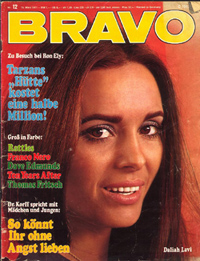
BRAVO Magazine, March 15, 1971
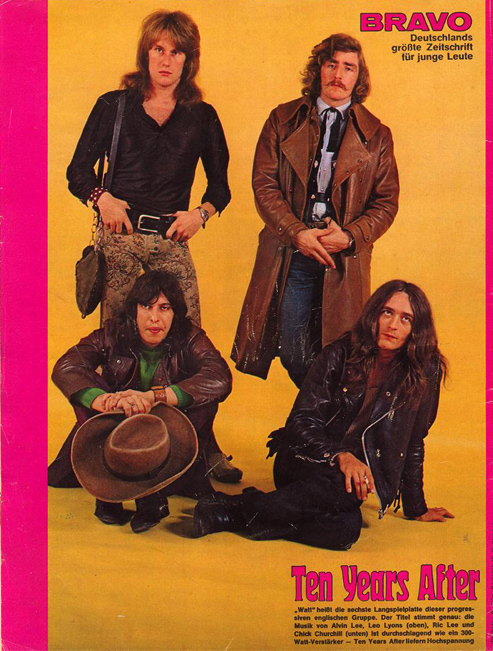
|
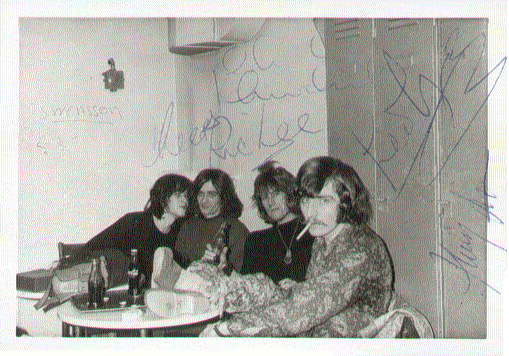
|
20 March,
1971 - Melody Maker, UK
Interviews /
Concert Review, page 24 & 25
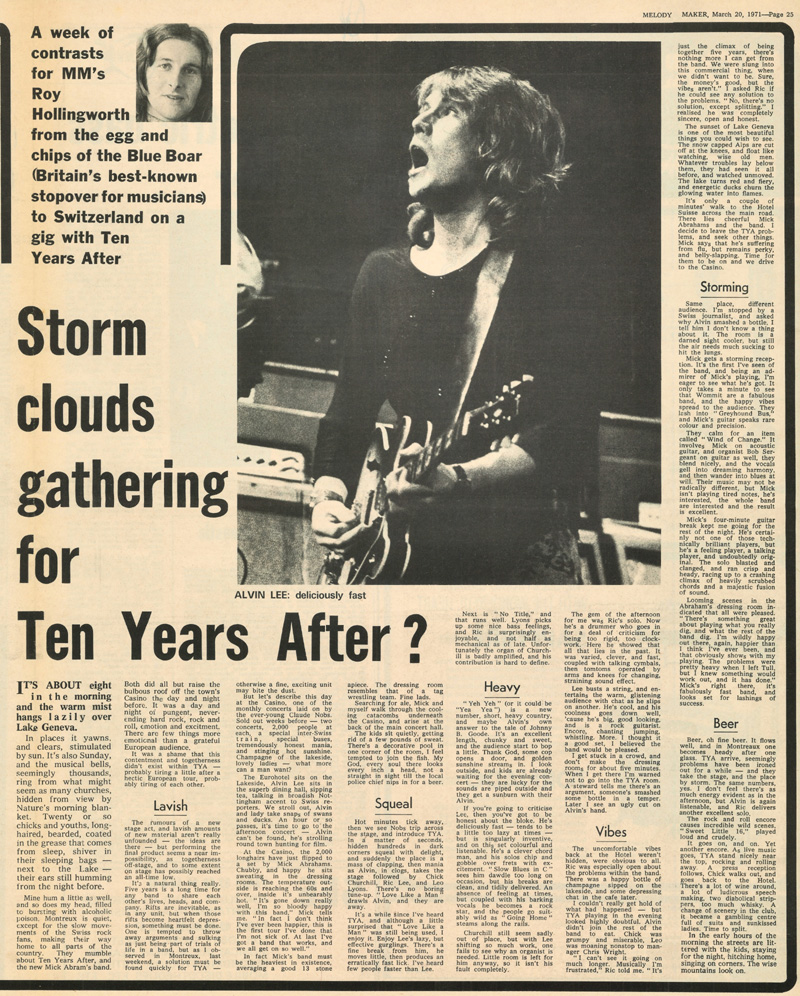
It’s about eight in
the morning and the warm mist hangs lazily over Lake
Geneva.
In places it yawns,
and clears, stimulated by sun. It’s also Sunday, and the
musical bells, seemingly thousands, ring from what might
seem as many churches, hidden from view by nature’s morning
blanket. Twenty or so chicks and youths, long haired,
bearded, coated in the grease that comes from sleep, shiver
in their sleeping bags, next to the lake, their ears still
humming from the night before. Mine hum a little as well,
and so does my head, filled to bursting with alcoholic
poison. Monteux is quiet, except for the slow movements of
the Swiss rock fans, making their way home to all parts of
the country. They mumble about Ten Years After, and the new
Mick Abram’s band. Both did all but raise the bulbous roof
off the town’s Casino the day and night before. It was a
day and night of pungent, never ending hard rock, rock and
roll emotion and excitement. There are few things more
emotional than a grateful European audience. It was a shame
that this contentment and togetherness didn’t exist within
Ten Years After,
probably tiring a little after a hectic European tour,
probably tiring of each other.
Lavish:
The rumours of a
new stage act, and lavish amounts of new material aren’t
really unfounded, these ideas are there, but performing the
final product seems a near impossibility, as togetherness
off-stage, and to some extent on stage has possibly reached
an all time low.
It’s a natural
thing really. Five years is a long time for any band to
share each other’s lives, heads and company. Rifts are
inevitable, as in any unit, but when those rifts become
heartfelt depression, something must be done. One is
tempted to throw away arguments and sulking as just being
part of trials of life in a band, but as I observed in
Monteux, last weekend, a solution must be found quickly for
Ten Years After, otherwise a fine, exciting unit may bite
the dust. But let’s describe this day at the Casino, one of
the monthly concerts laid on by the ever-young Claude Nobs.
Sold out weeks before, two concerts, 2,000 people at each,
a special inter-Swiss train, special buses, tremendously
honest mania, and stinging hot sunshine.
Champagne of the
lakeside, lovely ladies, what more can a man want? The
Euro-Hotel sits on the lakeside, Alvin Lee sits in the
superb dining hall, sipping tea, talking in broadish
Nottingham accent to Swiss reporters. We stroll out, Alvin
and lady take snaps of swans and ducks. An hour or so
passes, it’s time to go to the afternoon concert, Alvin
can’t be found, he’s strolling around town hunting for
film. At the Casino, the 2,000 longhairs have just flipped
to a set by Mick Abraham’s. Chubby, and happy he sits
sweating in the dressing rooms. The temperature outside is
reaching the 60’s and over, inside it’s unbearably hot.
“It’s gone down
really well, I’m so bloody happy with this band,” Mick
tells me. “In fact I don’t think I’ve ever been happier,
this is the first tour I’ve done that I’m not sick of. At
last I’ve got a band that works, we all get on so well”. In
fact Mick’s band must be the heaviest in existence,
averaging a good thirteen stone apiece. The dressing room
resembles that of a tag wrestling team. Fine lads.
Searching for ale, Mick and myself walk through the cooling
catacombs underneath the Casino, and arise at the back of
the main concert hall. The kids sit quietly, getting rid of
a few pounds of sweat. There’s a decorative pool in one
corner of the room, I feel tempted to join the fish. My
God, every soul there looks every inch a head, not a
straight in sight till the local police chief tips in for a
beer.
Squeal:
Hot minutes tick
away, then we see Nobs trip across the stage, and introduce
Ten Years After. In a matter of
seconds, hidden hundreds in dark corners squeal with
delight, and suddenly the place is a mass of clapping, then
mania as Alvin, in clogs, takes the stage followed by Chick
Churchill, Ric Lee, and Leo Lyons. There’s no boring
tune-up. “Love Like A Man” drawls Alvin, and they are away.
It’s awhile since I’ve heard Ten Years After, and although
a little surprised that “Love Like A Man” was still being
used, I enjoy it. Enjoy Lee’s lazy, but effective
gurglings. There’s a fine break from him, he moves little,
then produces an erratically fast lick. I’ve heard few
people faster than Lee. Next is “No Title” and that runs
well. Lyons picks up some nice bass feelings, and Ric is
surprisingly enjoyable, and not half as mechanical as of
late. Unfortunately, the organ of Churchill is badly
amplified, and his contribution is hard to define.
Heavy:
“Yeh -Yeh” (or it
could be “Yea – Yea”) It’s a new number, short, heavy
country and maybe Alvin’s own answer to the tale of Johnny
B. Goode. It’s an excellent length, chunky and sweet, and
the audience start to bop a little. Thank God, some cop
opens a door, and golden sunshine streams in. I look
outside, and kids are already waiting for the evening
concert, they are lucky, for the sounds are piped outside
and they get a sunburn with their Alvin. If you’re going to
criticise Lee, then you’ve got to be honest about the
bloke. He’s deliciously fast, and tends to be a little too
lazy at times, but is singularly inventive, and on this set
colourful and listenable. He’s a cleaver chord man, and his
solo’s chip and gobble over frets with excitement. “Slow
Blues In C” sees him dawdle too long on occasion, but his
breaks are clean, and tidily delivered. An absence of
feeling at times, but coupled with his barking vocals he
becomes a rock star, and the people go suitably wild as
“Going Home” steams along the rails. Churchill still seems
sadly out of place, but with Lee shifting so much work, one
fails to see why an organist is needed. Little room is left
for him anyway, so it isn’t his fault completely. The gem
of the afternoon for me was Ric’s solo. Now he’s a drummer
who goes in for a deal of criticism for being too rigid,
too clockwork. Here he showed that all that lies in the
past. It was varied, clever, and fast, coupled with talking
cymbals, then tom-toms operated by arms and knees for
changing, straining sound effect. Lee bust a string, and
entertains the warm, glistening audience with chat as he
slips on another. He’s cool, and his coolness goes down
well, cause he’s big, good looking, and is a rock
guitarist. Encore, chanting jumping, whistling. More. I
thought it was a good set, I believed the band would be
pleased. I get stuck in the crowd and don’t make the
dressing rooms for about five minutes. When I get there I’m
warned not to go into the Ten Years After room. A steward
tells me there’s an argument, someone’s smashed some bottle
in a temper. Later I see an ugly cut on Alvin’s hand.
Vibes:
The uncomfortable
vibes back at the hotel weren’t hidden, and obvious to all.
Ric was especially open about the problems within the band.
There was a happy bottle of champagne sipped on the
lakeside, and some depressing chat in the café later. I
couldn’t really get hold of what had happened, but Ten
Years After playing in the evening looked highly doubtful.
Alvin didn’t join the rest of the band to eat. Chick was
grumpy and miserable. Leo was moaning non-stop to manager
Chris Wright. “I can’t see it going on much longer.
Musically I’m frustrated,” Rick told me. “It’s just the
climax of being together for five years there’s nothing
more I can get from the band. We were slung into this
commercial thing, when we didn’t want to be. Sure, the
money’s good, but the vibes aren’t”. I asked Ric if he
could see any solution to the problems. “No, there’s no
solution, except splitting”. I realized that he was
completely sincere, open an honest. The sunset of Lake
Geneva is one of the most beautiful things you could wish
to see. The snow capped Alps are cut off at the knees and
float like watching, wise old men. What ever troubles lay
below them, they had seen it all before, and watched
unmoved. The lake turns red and fiery, and energetic ducks
churn the glowing water into flames. It’s only a couple of
minutes walk to the hotel Suisse across the main road.
There lies cheerful Mick Abrahams and band. I decide to
leave the Ten Years After problems and seek other things.
Mick says that he’s suffering from the flu, but remains
perky, and belly- slapping. Time for them to be on, and we
drive to the Casino.
Storming:
Same place,
different audience. I’m stopped by a Swiss journalist, and
asked why Alvin smashed a bottle. I tell him, I don’t know
a thing about it. The room is a darned sight cooler, but
still the air needs much sucking to hit the lungs. Mick
gets a storming reception. It’s the first I’ve seen of the
band, and being an admirer of Mick’s playing, I’m eager to
see what he’s got. It only takes a minute to see that
Wommit are a fabulous band, and the happy vibes spread to
the audience. The lash into “Greyhound Bus,” and Mick’s
guitar speaks rare colour and precision. They calm for an
item called “Wind of Change”. It involves Mick on acoustic
guitar, and organist Bob Sergeant on guitar as well, they
blend nicely, and the vocals gell into dreaming harmony,
and then wander into blues at will. Their music may not be
radically different, but Mick isn’t playing tired notes,
he’s interested, the whole band is interested and the
result is excellent. Mick’s four minute guitar break kept
me going for the rest of the night. He’s certainly not one
of those technically brilliant players, but he’s a feeling
player, a talking player and undoubtedly original. The solo
blasted and changed, and ran crisp and heady, racing up to
a crashing climax of heavily scrubbed chords and a majestic
fusion of sound.
Looming scenes in
the Abraham’s dressing room indicated that all were
pleased. “There’s something great about playing what you
really dig, and what the rest of the band dig. I’m wildly
happy out there, again, happier than I think I’ve ever
been, and that obviously shows with my playing. The
problems were pretty heavy when I left Jethro Tull, but I
knew
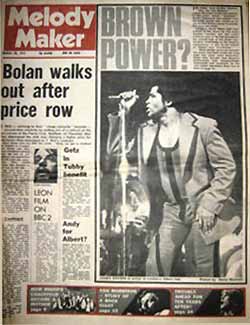 something would work out, and it has done”. Mick’s
right there, it’s a fabulously fast band and looks set for
lashings of success. something would work out, and it has done”. Mick’s
right there, it’s a fabulously fast band and looks set for
lashings of success.
Beer:
Beer, oh fine beer.
It flows well, and in Monteux one becomes heady after one
glass.
Ten Years After arrive, seemingly problems have been
ironed out for awhile, and they take the stage, and the
place by storm. The same numbers, yes. I don’t feel there’s
as much energy evident as in the afternoon, but Alvin is
again listenable, and Ric delivers another excellent drum
solo. The rock and roll encore causes incredible wild
scenes, “Sweet Little Sixteen” played loud and crudely. It
goes on and on. Yet another encore. As live music goes, Ten
Years After stands nicely near the top, rocking and rolling
away. A press reception follows, Chick walks out, and goes
back to the hotel. There’s a lot of wine around, a lot of
ludicrous speech making, two diabolical strippers, too much
whisky. A change of scenery in the club, as it became a
gambling centre full of suits and sun kissed ladies. Time
to split. In the early hours of the morning the streets are
littered with the kids, staying for the night, hitching
home, singing on corners. As the wise mountains look on.
|
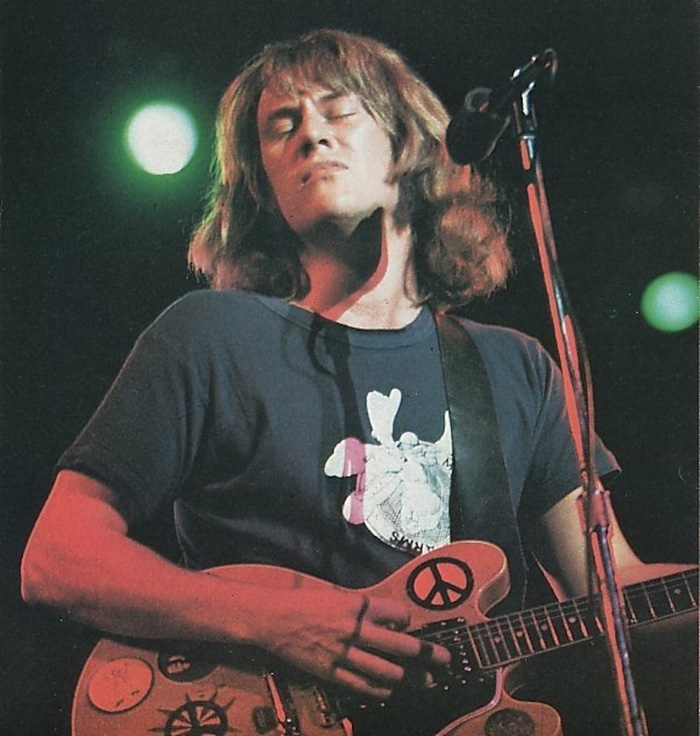
April 1971
|
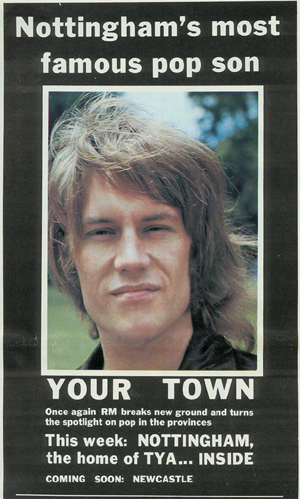
|
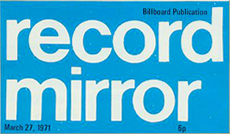
It
was during the very first nasal whinings of
the ‘Beatles’ “Love Me Do” that were
wafting over the air waves that a group
calling themselves The Jaybirds were having
their first experience of flower power, in the
form of a Chrysanthemum Society. The focal
point of this three man outfit was Alvin Lee,
who was a short, and fair youth, who sported
skin tight cavalry twill trousers, with loose
fitting waistcoats, with his hair slicked back
in the true Elvis Presley style.
Alvin and his band performed on Friday
evenings, and sometimes on Mondays as well, at
the St. Michael’s Church Hall, Sutton in
Ashfield, at an event known to the locals as
the Sutton ‘op or pronounced as Sut’nop.
The entrance fee was just two bob, and if
Alvin and the band made a fiver on the night
they were more than satisfied. That explains
why the Sutton in Ashfield, and the District
Chrysanthemum and Dahlia Society in general
were regarded as something of a fly in the
group’s ointment, so to speak.
|
As this small
Society used the very same hall favoured by
the huge, and frequently war like patrons of
the Sut’nop and on two weekends a year they
saw the need to hold their early / late flower
shows there. When this happened, it meant
there were to be no Friday night ‘hop’ for
the Jaybirds, and the need to find a new and
quite possibly, a much less appreciative
audience to win over, was the case. To be sure,
the patrons of the Sut’nop were not renowned
for their delicacy or restraint by any means,
but it was during this time that the last
desperate remains of the “Teddy Boy” phase
were struggling unsuccessfully for their drape
jacketed survival. These groups of
youths, and many of them
scuffing their large pit boots menacingly along the
entrance, and on into the hall, would arrive
promptly at seven p.m. with their best ladies at
their side for the start of the evenings
entertainment. It wasn’t until about seven thirty
that the pit boots along with drainies had left
their girlfriends and lovers behind to listen to the
power chords and fast riffs of Alvin’s already
blistering lead guitar solos, and proceeded to walk
across the road to the popular Dew Drop Inn. Now
what was the reason for them leaving the concert you’re
wondering? It had nothing what’s so ever to do
with The Jaybirds, but the story is double sided. In
the first place, the good folks at St. Michael’s
Church run an alcohol free establishment, the only
refreshments served there are coke-a-cola and orange
juice, with or without ice! Secondly, the fine ale
across the street was only 1s 5d for a pint, at the
Dew Drop or at the New Cross Hotel, as the fine
folks new to Sutton referred to it. So at about nine
forty five in the evening, the Smokey thick
atmosphere filled the whole tap room, and was now
working its magic, along with all the muted oaths,
and the extravagant claims of large amounts of ale
supped, as the pit boots trooped back into the
church hall once again.
They would have remained back at the pub, and
fastened to their pints long after the final request
for their departure coming from the land-lord,
except for one important factor, they didn’t want
to miss all the action and frenzy that was going on
towards the end of the concert. Everyone knew, that
the show finished at ten p.m. and it was quarter to
the hour now. Alvin and the band could be heard at
their loudest and best. The reason for this was due
to the fact that the last part of the hour of their
performance consisted invariably of misguided
attempts to make themselves heard above the frenzy
caused by the two hundred people who were very
intent on fulfilling the mass ritual of fisticuffs.
It seems that the trouble always started with the
return of the pit boot brigade from the pub. While
they were away the younger crowd had remained at the
hall and proceeded to take liberties with the pit
boots lady friends, with a little dancing on the
floor. A very unwise decision to be sure, as these
youngsters found themselves confronted with very
large, very drunken, and very aggressive pairs of
pit boots coming directly at them.
Leave it to the Jaybirds at this point, to go into
songs like “Carol” and Johnny B. Goode.” As
Alvin’s fingers would be working overtime while he
was sweating furiously in order to drown out the
boot crunch against the bone sound! It should be
noted, that during one of these particularly
prolonged and spectacular melee, that the first long
introduction to a song was born. As back in those
days bands playing in front of a live audience,
rarely if ever moved outside of the tight and very
limited confines of the conventional three minute
format of their numbers. It was in this area that
Alvin Lee was one of the first to break into new
territory when he was forced to play a lashing,
stinging five minute guitar solo at the beginning of
the song “Money” while chairs and fists were
flying dangerously close to the stage area. Back in
those days Alvin had quite a growing reputation for
being an innovator, some people have never recovered
from the traumatic effects of the time he walked
into the hall wearing the very first pair of Cuban
heel boots ever to be seen in Sutton. This event
alone, in the face of all those pit boots, was to
say the least a brave gesture at that. Although
Alvin had a certain polish even back then.
The group’s version of “Poison Ivy” was
thought by many to be even better than The Rolling
Stones Version which was released on EP. No one but
Alvin could change from rhythm guitar to lead guitar
with quite the same panache. As all good things come
to an end, The Jaybirds were lost forever to make
way for the “Bee-Hive Hairdoes and the Pit Boots
of St. Michael’s. Moving forward, the gigs at
nearby Mansfield Palais were to be the next step up
the ladder of success, and before very long even
little Nottingham had fallen at the feet of the
blonde, speed, freak and his band. But The Jaybirds
have certainly come a long way since those meagre
days so long ago.
They’ve managed to sell a lot of records, and made
a great deal of money while touring America.
Although they’re no longer called The Jaybirds,
because somewhere along the line bass player Leo
Lyons came up with the name that would make the
world stand up and take notice of “TEN YEARS AFTER”.
|
|
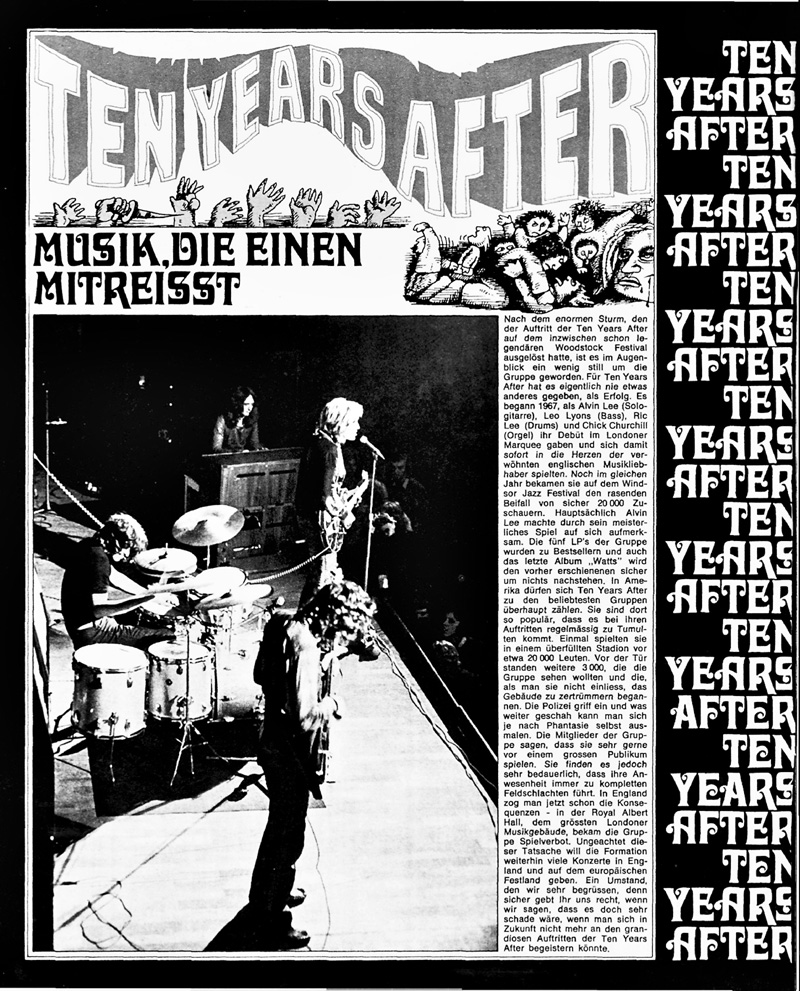
April 1971 -
Musik Express Magazine, Germany page 1 & 2
Photo: Wolfgang "Bubi"
Heilemann
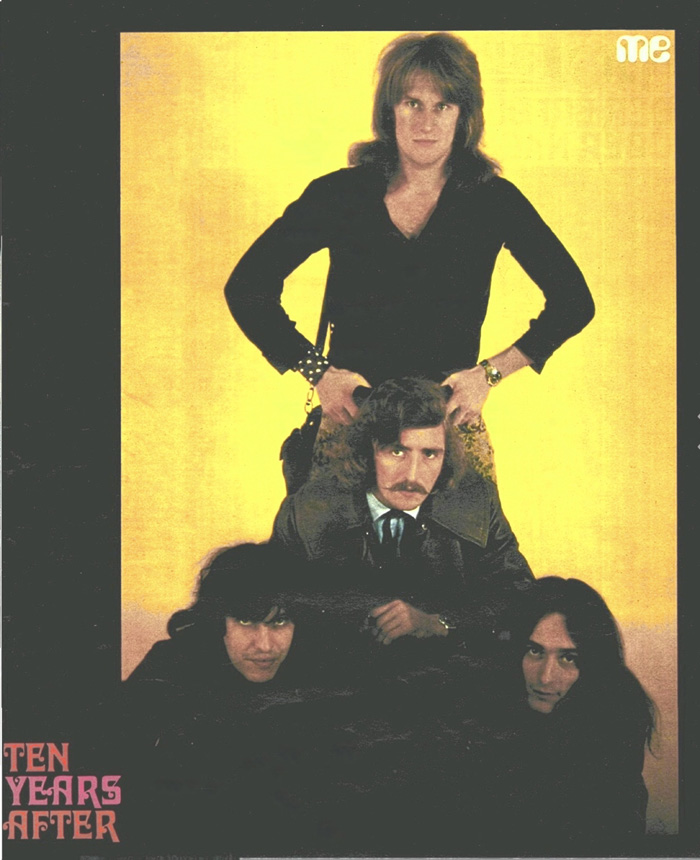
April 1971 -
Circus Magazine
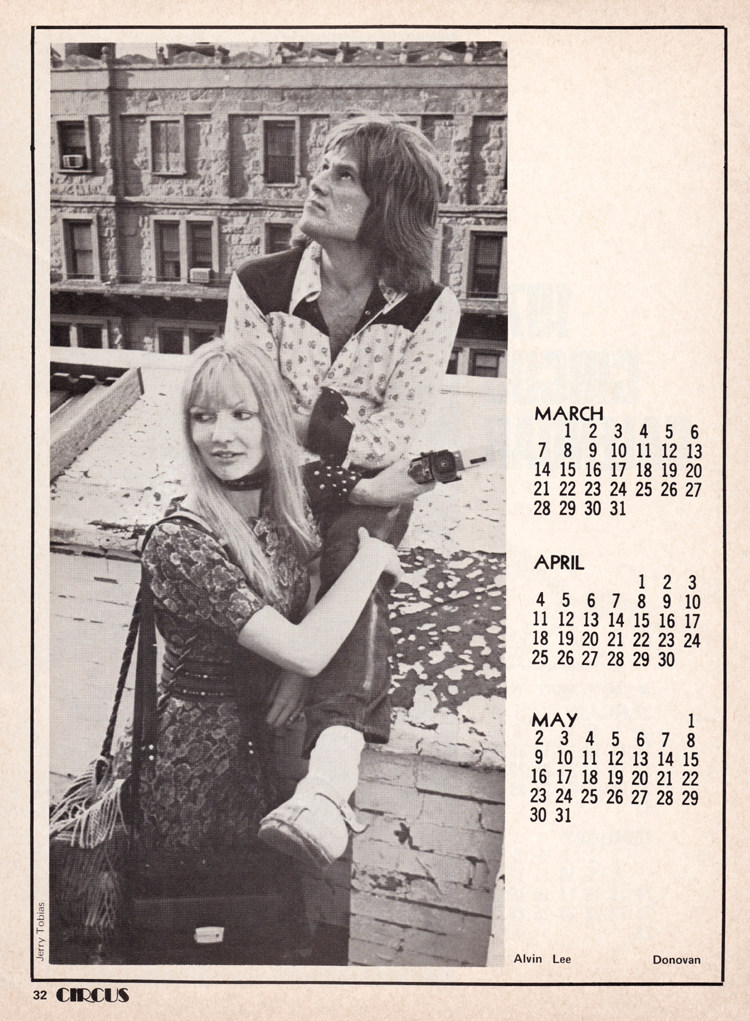
page 32 - Photo: Jerry
Tobias
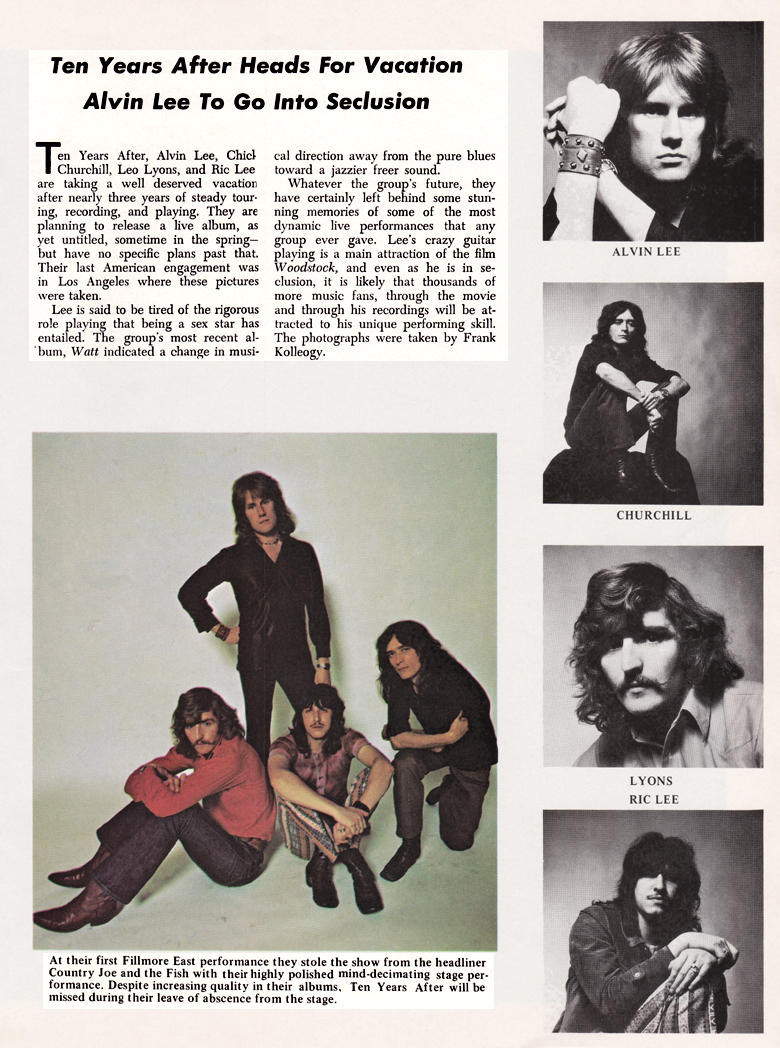
page 33 - Ten Years After in
Los Angeles
- Photos: Frank Kolleogy -
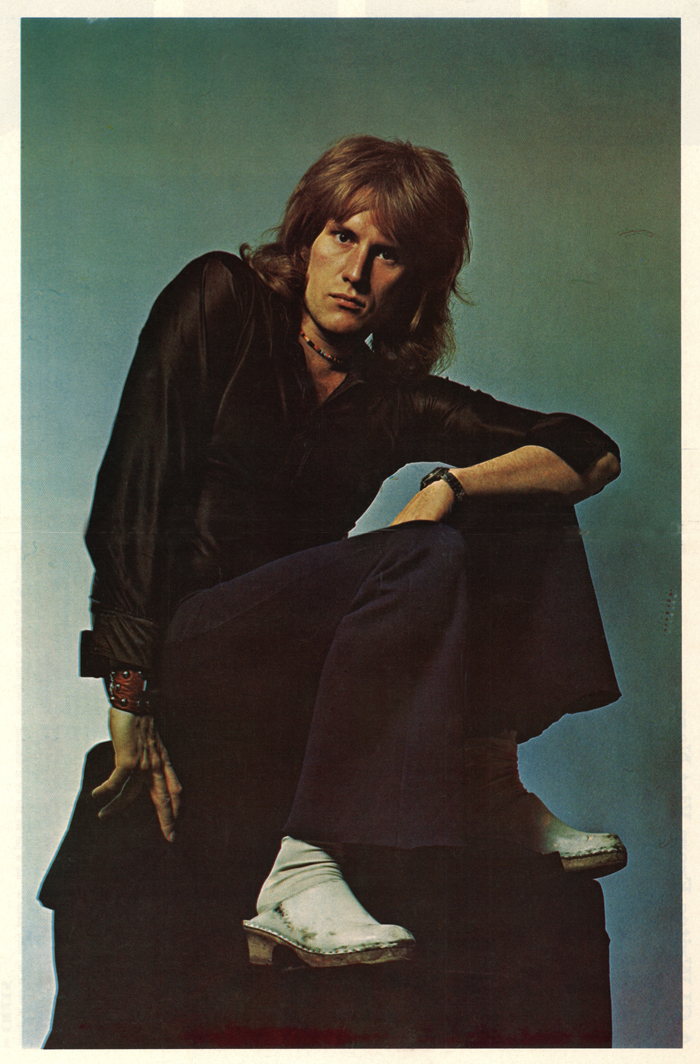
Circus Magazine, page 34/35
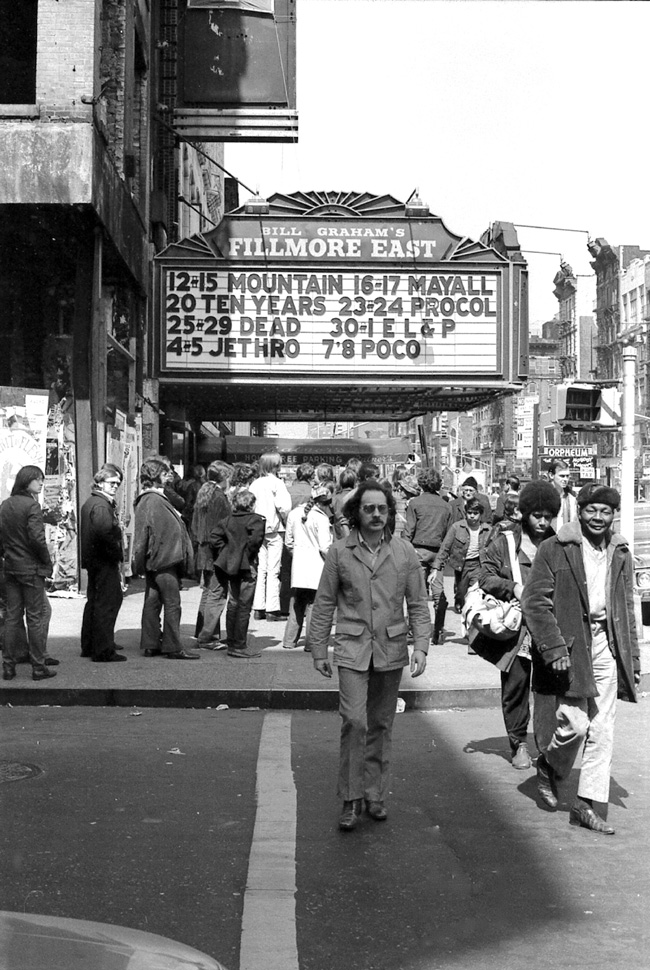
April 20, 1971 -
Fillmore East, NYC
|
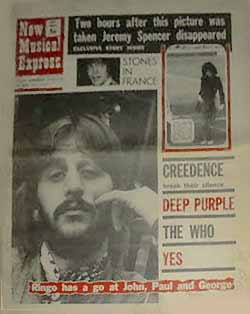
New Musical
Express – April 24, 1971

For the third
time this year, Ten Years After’s management is
attempting to arrange a
British concert tour for the group. Both the earlier
attempts ended in failure because of the
unavailability of a suitable London venue. The group
has not toured this country (England) since 1970. A
spokesman for Ten Years After told the New Musical
Express: “It is important to appear in London at the
beginning of a major concert tour, and we tried to the
Royal Albert Hall, for two projected tours, but they
would not accept the booking”. Currently touring
America, Ten Years After returns to this country in
early May, and then immediately begin work on a new
album which is expected to be released in July or
August. |
|
April 16, 1971
Ten Years
After – Boston, Massachusetts – With Cactus
and opening band Humble Pie
April 17, 1971
Friday
Ten Years
After at State Fair
Coliseum Syracuse, New York - Opening band
Humble Pie
April 23, 1971
and April 24, 1971
Ten Years After at Dania, Florida
– Pirates World with opening band Humble Pie
May 2, 1971
Ten Years
After at Long Beach,
California Arena with Cactus and Humble Pie
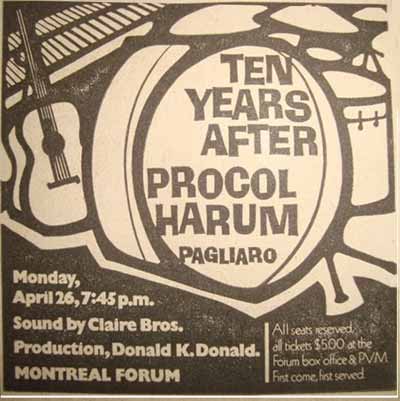
26 April 1971
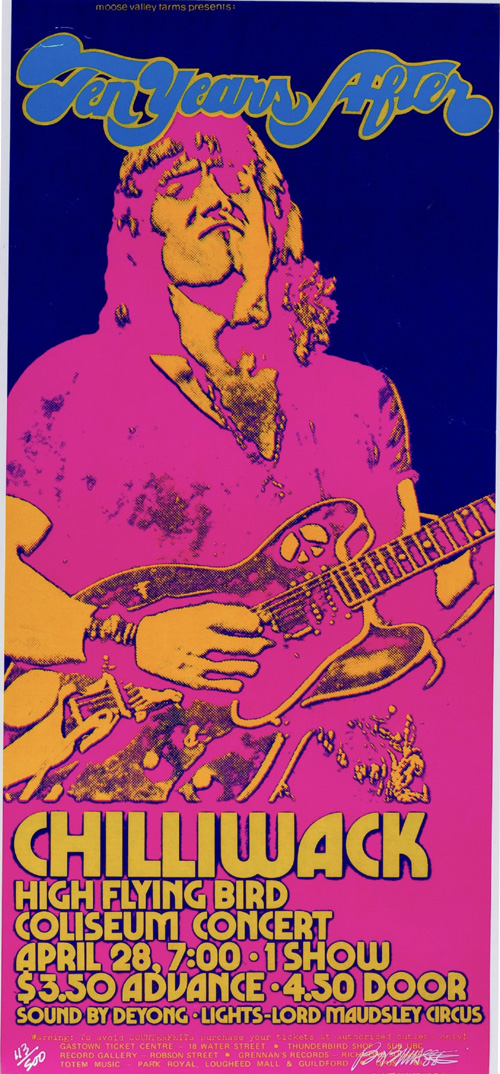
28 April, 1971 -
Pacific Coliseum, Vancouver, Canada - Concert Poster
April 30 - May 1, 1971
- Winterland, San Francisco

Concert Poster (above) and
Postcard (below)
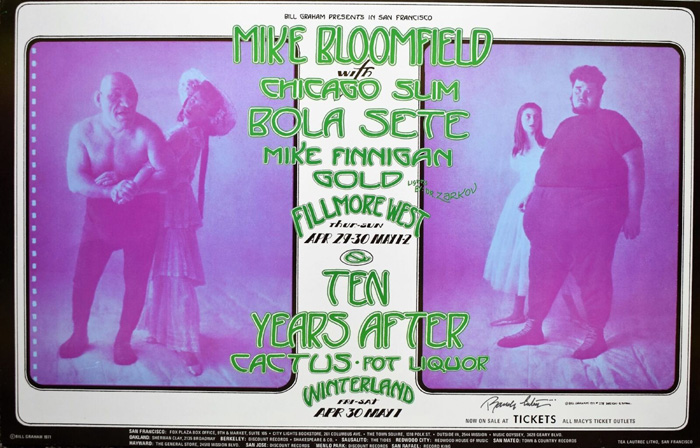
front
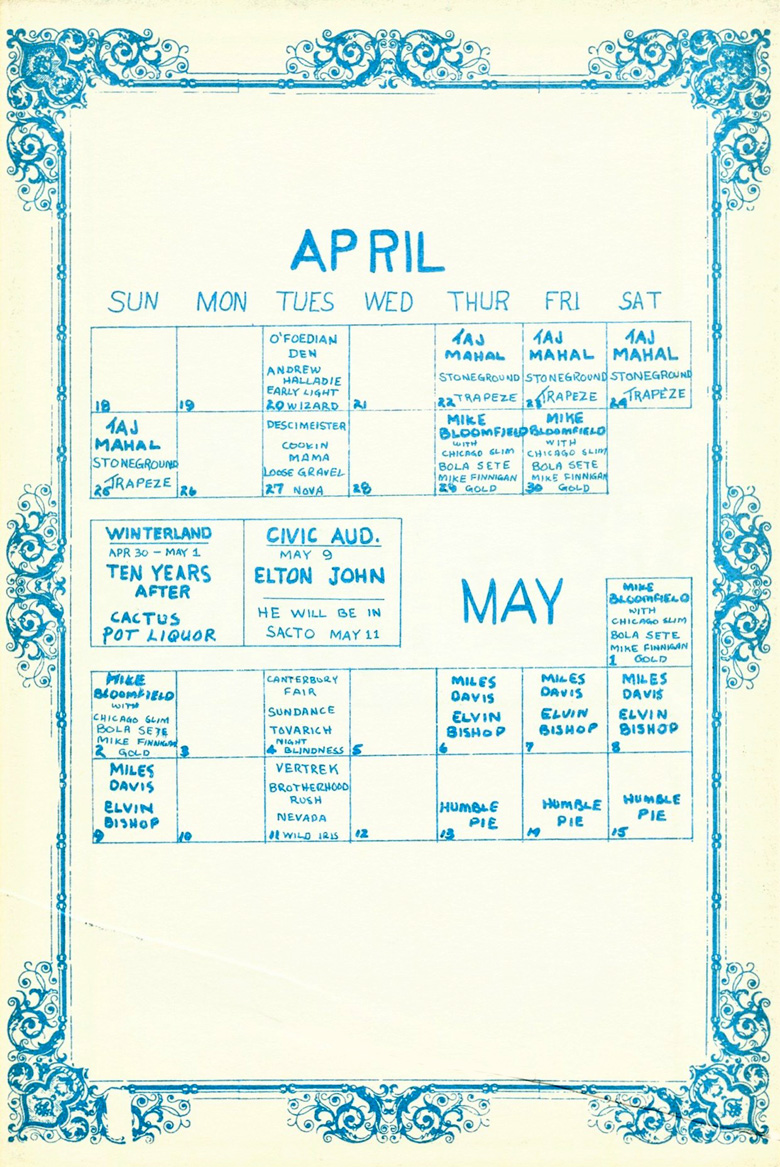
back
|
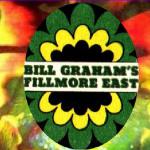
The
More Things Change, The More They Stay The Same:
In an open letter appearing on page 45 of the May 6th,
1971 edition of The Village Voice, Bill
"Uncle Bobo" Graham
published an open, 'Dear Friends' letter explaining
his reasons for closing
down the famous venues. The seven reasons he
enumerated are quoted exactly as they were published -
and resonate as much (if not more) today, then they
did 35 years ago - - -
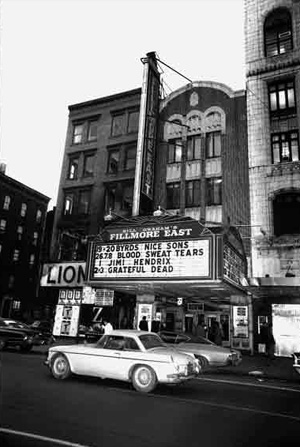
April 29, 1971
Dear Friends:
Ever since the creation of the Fillmores, it was my
sole intention to do nothing more, or less, than
present the finest contemporary artists in this
country, on the best stages and in the most pleasant
halls.
The scene has changed and, in the long run, we are all
to one degree or another at fault. All that I know is
that what exists now is not what we started with, and
what I see around me now does not seem to be a logical,
creative extension of that beginning. Therefore, I am
taking this opportunity to announce the closing
of the Fillmores, and my eventual withdrawal from
producing concerts.
The process will commence with the formal closing
of Fillmore East on Sunday, June 27, 1971.
My reasons are as follows:
Reason #1
"The
unreasonable and totally destructive inflation of the
live concert scene. Two years ago I warned that the
Woodstock Festival syndrome would be the beginning of
the end. I am sorry to say that I was right. In 1965
when we began the original Fillmore Auditorium, I
associated with and employed "musicians."
Now, more often than not, it's with "officers and
stockholders" in large corporations - only they
happen to have long hair and play guitars. I
acknowledge their success, but condemn what that
success has done to some of them. I continue to
deplore the exploitation of the gigantic-hall concerts,
many of them with high-priced tickets. The sole
incentive of too many has simply become money. The
conditions for such performances, besides lacking
intimacy, are professionally impossible according to
my standards."
Reason #2
"I
had always hoped to be able to present artists whose
musical worth I felt was important: artists whose
music was valid, whether commercially popular or not.
There are more quality artists today; but many of
those that do exist do not appear in public regularly.
Therefore, in order to stay in business, I would be
forced to present acts whose musicality fell below my
personal expectations and demands. I could do this,
and in having to book fifty-two weeks a year it
becomes tempting because it is so much easier to do.
Thousands might even come to these concerts, but I
personally would prefer not to present them. For who
would gain?"
Reason #3
"With
all due respect for the role they play in securing
work for the artists, the agents have created a new
rock game called "packaging"; which means
simply that if the Fillmore wants a major headliner,
then we are often forced to take the second and/or
third act that the agent or manager insists upon,
whether or not we would take pride in presenting them,
and whether or not such an act even belongs on that
particular show. To do so would be to relinquish the
essential responsibility of being a producer, and this
I will not do."
Reason #4
"In
the early days of both Fillmore East and West, the
level of audience seemed much higher in terms of
musical sophistication. Now there are too many screams
for "More" with total disregard for whether
or not there was any musical quality."
Reason #5
"The
time and energy that is required for me to maintain a
level of proficiency in my own work has grown so great
that I have simply deprived myself of a private life.
At this point I feel that I can no longer refuse
myself the time, the leisure, and the privacy to which
any man is rightfully entitled."
Reason #6
"For
six years, I have endured the abuse of many members of
the public, and press (in most instances people who
did not know me personally). The role of "anti-christ
of the underground" has obviously never appealed
to me. And when I asked for people to either judge me
on some factual personal knowledge, or at least base
their opinion on that which I produced and gave to the
public, I was rarely answered."
Reason #7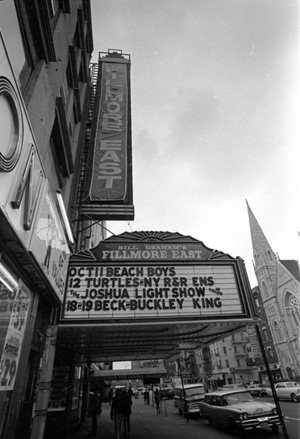
"Rock
has been good to me in many ways, but the final and
simple fact is that I am tired. The only reason to
keep the Fillmore in operation at this point would be
to make money. And though few have ever chosen to
believe me on this point, money has never been my
prime motivation; and now that it would become the
only possible motivation to continue, I pass."
In Closing...
My
personal future will begin with a long-needed rest.
What will follow, I do not know. The several hundred
good people who work at the Fillmore, maniacally
dedicated to our standards, will, no doubt, go on to
other creative things on their own. Fillmore West, as
you may know, has been allocated for demolition for a
long time now. It will neither relocate nor be
reopened.
The "Fillmore" will become a thing of the
past. I will remember with deep emotion and fondness
the great and joyous moments of that past. I sincerely
thank the artists and business associates who
contributed to our success. But, I warn the public to
watch carefully for what the future will bring.
The rock scene in this country was created by a need
felt by the people, expressed by the musicians, and, I
hope, aided to some degree by the efforts of the
Fillmores. But whatever has become of that scene,
wherever it turned into the music industry of
festivals, 20,000-seat halls, miserable production
quality, and second-rate promoters - however it went
wrong - please, each of you, stop and think whether or
not you allowed it, whether or not you supported it
regardless of how little you received in return.
I am not pleased with this "music industry."
I am disappointed with many of the musicians working
in it, and I am shocked at the nature of the millions
of people who support that "industry"
without asking why. I am not assured that the
situation will improve in the future.
But beyond all these viewpoints, I truly wish to
express my overwhelming appreciation to the people,
who, over the years, gave their time and devoted
energy to working at the Fillmores. To them, and to
many, many musicians who grew in stature without ever
copping out, and to those admirable patrons who both
refused to support marathon rip-offs and who even took
the time to helpfully criticize me for the errors I
made - to all of you, my fondest thanks and farewell.
Sincerely,
Bill Graham
|
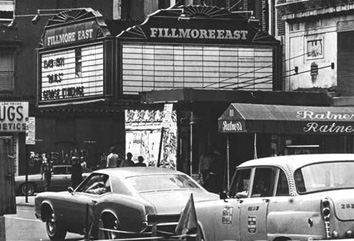
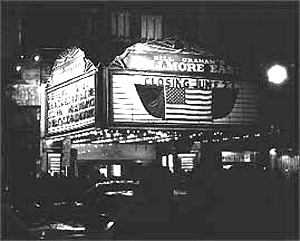 |

May
1971
|
|
Bill Graham’s
“Winterland” San Francisco, California
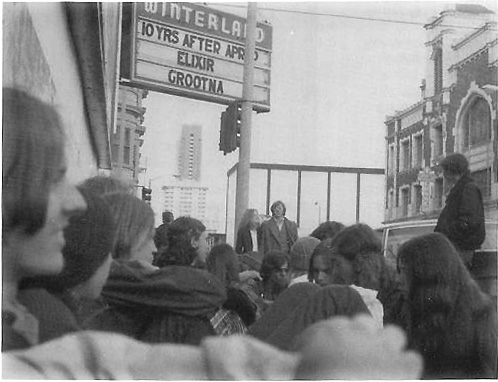 Called The
Winterland Ballroom in San Francisco, is often referred to
as the Winterland Arena or simply – Winterland. It was
originally built and opened June 29, 1928 as an ice skating
rink, over the years it was also a showcase for Opera’s,
Boxing and The Ice Follies.
Winterland was
located at the corner of Post Street and Steiner Street. It
was converted to a music venue in 1971 by legendary rock
promoter Bill Graham. Graham turned the old ice skating
rink into a music venue that seated some 5,400 people.
Winterland closed New Years Eve of 1978 going into 1979.
The entire building was demolished in 1985 and replaced by
condominiums. During its hay-day some of the best bands,
musicians and artists played there, including: Jefferson
Airplane, The Grateful Dead, Ten Years After, Heart, Yes,
Kiss, Grand Funk Railroad, Journey, Joni Mitchell, Led
Zeppelin, Humble Pie, Peter Frampton, ELO, ELP, Neil Young,
Eric Clapton, Bob Dylan, Cream, Allman Brothers Band,
Rolling Stones, Traffic, Golden Earring, Bob Seger, Boston,
The Sex Pistols, Bruce Springsteen, Lynard Skynard,
Genesis, Loggins and Messina, Pink Floyd, The Band, Jethro
Tull, The Doors, Jimi Hendrix, Steppenwolf, Styx and The
Paul Butterfield Blues Band…..and many more.
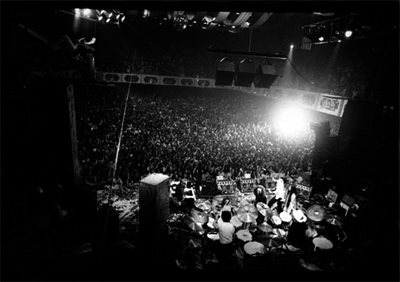
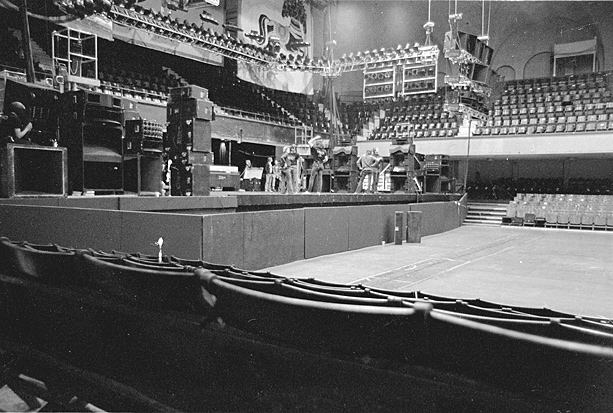
|
|
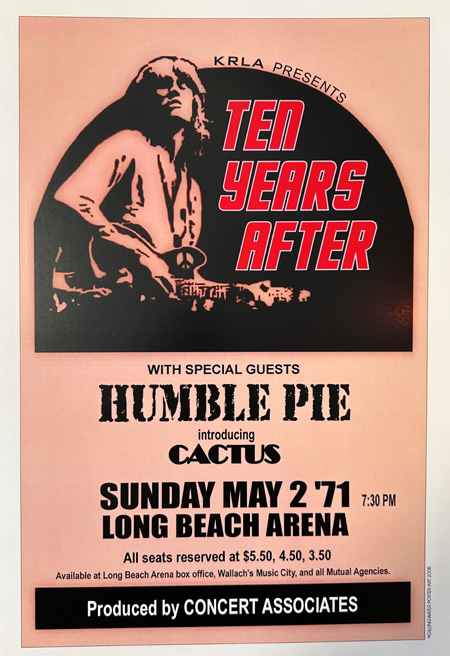
|
Long Beach California - The
opening act is Humble Pie. The concert is a sold out
event, and four hundred Ten Years After Fans will not be
allowed entry to the venue. Needless to say, they
are beyond being just angry they're pissed off and have turned
into a mob. The police are called in to resume order
and tear gas is used to quell the disgruntled mass.
Bottles are thrown and windows broken before all is
said and done. |
|
|
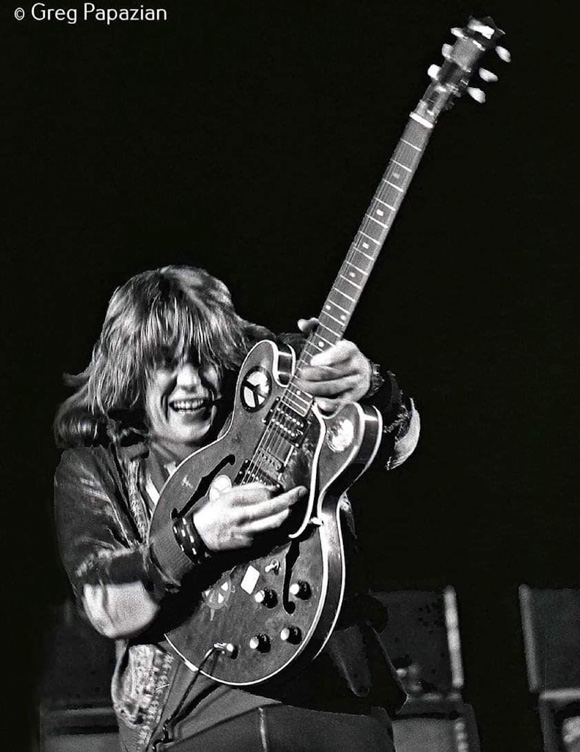
2 May 1971 -
Long Beach Arena, Long Beach, CA. /
Photo: Greg Papazian
|
|
May 8, 1971 -
New Musical Express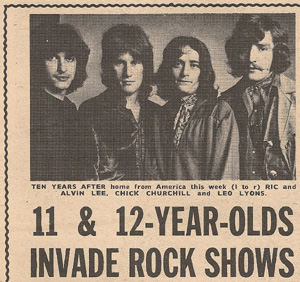
By Nancy Lewis
in New York
11 and 12 Year
Olds Invade Rock Shows
Expect to hear
soon about a very impressive record deal involving Ten
Years After. No details are being released as I write
however. The group has been touring America, creating
the usual sensations. Ten Years After came to New
York’s Fillmore East for one night only.
Needless to
say, both shows were completely sold out well in
advance, and on the night, crowds lingered around the
front doors hoping for returned tickets. The early
show was somewhat disturbed, however, by over-eager
fans screaming out during the performance.
“We don’t mind
people leaping about dancing the part of our set when
we’re into our rock and roll mood,” Ric Lee told me,
“but it’s distracting to have all that going on when
we’re trying to play a blues number. It made us feel
tight during the first show. We were much looser in
the second house”. Although Ten Years After are
respected as “heavy” musicians they also have an
incredible following among the teenybopper set.
Whatever may be said about the disappearance of
American “screamers,” they seem to turn out in droves
for –
Ten Years After. I asked Ric if he felt their
audiences were unique. “I don’t think it’s only us,”
he said, “Several other groups I’ve spoken with have
said their audiences are getting younger. It amazes me
to see that the age group attending concerts, includes
a lot of 11 and 12 year olds now-a-days. “Possibly
some of this is due to the Woodstock film. Even though
it was released with an “R” rating, it had a
tremendous impact. It was certainly a positive factor
in the career of our group”. The group ended its tour
in Los Angeles on Sunday and should be back in London
by now, working on a new LP. It’s a rare occasion to
hear any “live” music on American radio stations, but
New York’s WPLJ (FM) is running a very successful
series of concerts. Such artist as Elton John, Taj
Mahal, Sea Train, Butterfield Blues Band, and this
week Procol Harum, have presented complete concerts,
broadcast live. Taped versions are aired later on
affiliated stations across the country. Strange, isn’t
it, to think that now-a-days, the broadcasting of live
music, is a real novelty in America!
|
| MUSIC
IS THE MESSAGE
SOUNDS MAGAZINE
From June 28, 1971
TEN YEARS AFTER AT HOME |
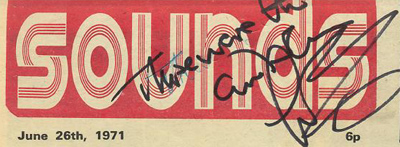
|
|
"Those were the days"
- Leo Lyons
|
LYONS´ COUNTRY COMFORTS
FEATURE
BY: ROYSTON ELDRIDGE
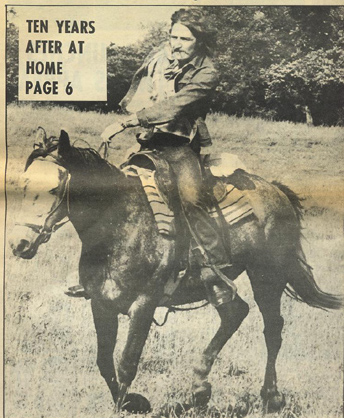
PICTURES
BY: SPUD MURPHY
“WE
TOOK THREE MONTHS OFF TO GET OURSELVES INTO
PERSPECTIVE”
LEO
LYONS
Rural
England is full of villages so small that if
you blink as you pass the first pub, you miss
the post office, the general store and the
church that seem to supply the needs of all
the inhabitants. One blink as you drive by and
they’re gone.
Up
in Bedfordshire, sixty miles on the motorway
from London, Leo Lyons loses himself in one of
those villages that isn’t full of antique
shops and that hasn’t as yet become
inundated with rock and rollers getting back
to the garden. Bedfordshire, you see, is
hardly hip Berkshire.
STUDIO:
It’s
doubtful anyway if the locals know they have
one musician in their mist. Ten Years After
spend the majority of their time out of
England, averaging out about three tours of
America and one of Europe a year, and when
he’s not playing bass Lyons slips into the
country life, building a new stable behind the
chicken coop, or tinkering about in the studio
he’s fitting up in the attic. If he’s not
doing that he goes riding on one of his horses
which a girl from the village exercises when
he’s away.
ALBUM:
Lyons,
Alvin Lee, Chick Churchill and Ric Lee have
just returned from their ninth American tour
and gone straight into the recording studios
to work on a new album and possibly a new
single, although they’re not to sure about
that.
RULES:
“We
haven’t done one since “Love Like A
Man”, we haven’t tried for one, but if one
comes out of the album and the record company
wants to use it, then I guess there’ll be
one, there’s a few things that could be
singles on the album. “It
was the fickleness that put us off, the
principle of making a number that is two
minutes long, you know, the rules that you are
supposed to abide by although I think that’s
going by the board a bit now. You’re getting
longer singles and they don’t follow the
sort of pattern they used to a couple of years
ago.
ELECTRIC:
“The
idea was that we didn’t want people to know
us for a single and not know anything else
about us. If the only reason people knew us
was because of one hit single then we’d feel
almost, in their eyes, finished if we didn’t
have another one, and we much prefer people to
know of us for what we do in an entirety, by
albums or concerts, rather than just a single,”
Lyons explains. It’s early afternoon and
he’s just got up after an all-night session
at the studio in London. He’s got a rough
mix of what they put down upstairs on the tape
machine in his own studio which he put
together
over the years and it’s full of
equipment, quad sound, control panels, and
even something he calls a “transistorised
drummer”. It’s a kind of electric
percussion machine and by linking it up with
one of his amps he can play and record on his
own. Whether
a single comes out of the album Ten Years
After are recording or not, the results of
their longest ever recording session will be
the first England has heard from them since
their last tour here. After that they toured
Europe and the States again and took a three
month lay-off period.
IDEA:
The
idea behind the lay-off, Lyons said, was to
get themselves and what they’ve done into
perspective and to catch up with what’s
happened, because it’s happened so fast
they’ve hardly realised it. “We get to the
stage where we were working all the biggest
halls in Europe and in America, forgetting
England for a moment because we reached that
stage here quite some time ago, and we
couldn’t figure out what shall we say,
direction things were going in.
We
didn’t like the idea that we’d just go
around and play all these enormous halls and
not really have any direction. So we had three
months off
to get ourselves into perspective, to
decide what we wanted to do and just to catch
up with things that have happened.
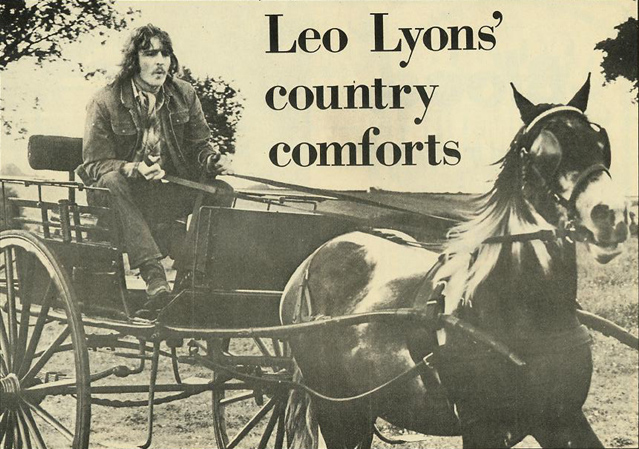
STAGES:
“And
it’s worked out okay. The band’s much
tighter now, much closer than it has been. Every
band goes through stages when they’re
striving and striving for something and then
all of a sudden they achieve possibly well
beyond what they anticipated and it gets to
the stage when you begin to think, “well
what the hell am I doing here?” “You see
we never really thought about making a lot of
money, or being really big or popular. The
only thing we considered was that we’d go
along and play music that we enjoyed, we
obviously hoped that people would enjoy it and
then all of a sudden it took off”.
AWARE:
“It
was quite a shock in a way. The difficult
thing is realising it and that’s why we had
this lay-off period, because we were going
along and it was all happening, but the four
of us were still on the same level, we
weren’t aware of what was happening exactly
outside”.
COMPETE:
“It
just seemed the same to us. We’re still
trying to play good music and we still have
good nights or bad nights, we know how well
we’ve played on a night of if we haven’t
played as well as we’d like even if the
audience doesn’t notice, because we’re
virtually competing
against ourselves as we have been doing
right from the beginning”.
REACTION:
One
of the things that Ten Years After did become
aware of was a change in their audience. Their
appearance in “Woodstock” made them and
even hotter commercial property than before
and in some areas they found what Lyons refers
to as a “screamer” type audience.
“We
don’t get any kicks out of people screaming
and shouting and mobbing the stage. We enjoy
it much more if people are reacting to what
we’re putting down on stage, than reacting
to something that they’ve heard about and
come along to see. You get to the stage where
your reputation causes a reaction before you
even play a note and under those circumstances
it’s difficult to play. The audience is at
such a pitch all the time, that whatever you
do, you don’t feel that you’re getting
through to them.
LIVE:
“We
prefer them to react to what we’re doing
rather than what they’ve heard we do”. It’s
been on live performances that Ten Years After
have built their reputation, rather than on
their albums, and the group are aware of that.
“We want to get our recordings up to the
standard of our live appearances,” Lyons
says. “With most bands,” he continues,
“it’s the other way round, they’re
bloody awful on stage, but they get it
together in the recording studio”. For this
album, Ten Years After have spent more days in
the studio, twenty three to date, than ever
before.
STRENGTH:
“Our
strength in the past has been improvisation
and the way we’ve done our material on stage,
rather than the material itself, but on the
new album the material is very strong. It’s
some of the best stuff that Alvin’s ever
written.”
Dave’s
Notes:
The
album that Leo was talking about was “A
Space In Time”. He is also correct that it
was the strongest material that Alvin had ever
produced up to that point. The time the band
took off really helped Alvin’s creative
process, as well as contributing to the entire
bands well-being. Looking back, the three
months they did receive, compared to the six
months that Alvin requested, was really no
time off at all. Then they were all back on
the road again.
The
album was their best seller, it went gold and
eventually platinum. The
album contained two radio hits: “I’d Love
To Change The World” and
“Baby
Won’t You Let Me Rock and Roll You”.
The
band also changed their record company, now
being signed to Columbia Records, they wanted
to showcase what they were really capable of,
far beyond the flashy speed guitar that Alvin
was known for, this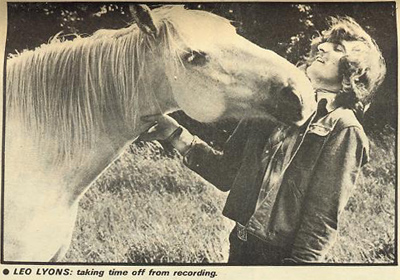 album was a direct
departure from that Woodstock Haze! album was a direct
departure from that Woodstock Haze!
Acoustic
Guitar work, tasty lyrics, thoughtful tunes
and torrid tempo jams.
On
my record shelf, it’s on a par the
“Who’s Next”
album – both released
the same month,
both classic rock albums for 1971.
From
Leo - His horses names back
then were "Jack" and
"Annie" (two popular characters from
an English soap opera). Then there's
"Trigger" and one named
"Joe".
|
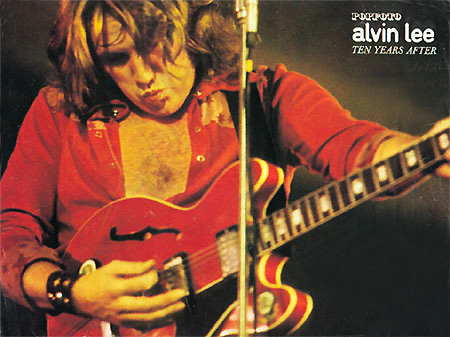
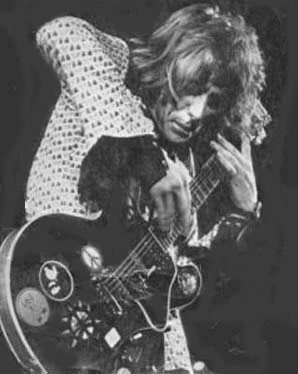
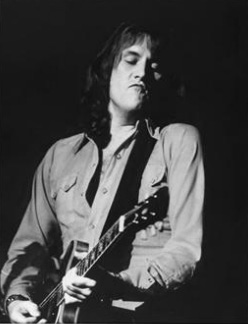
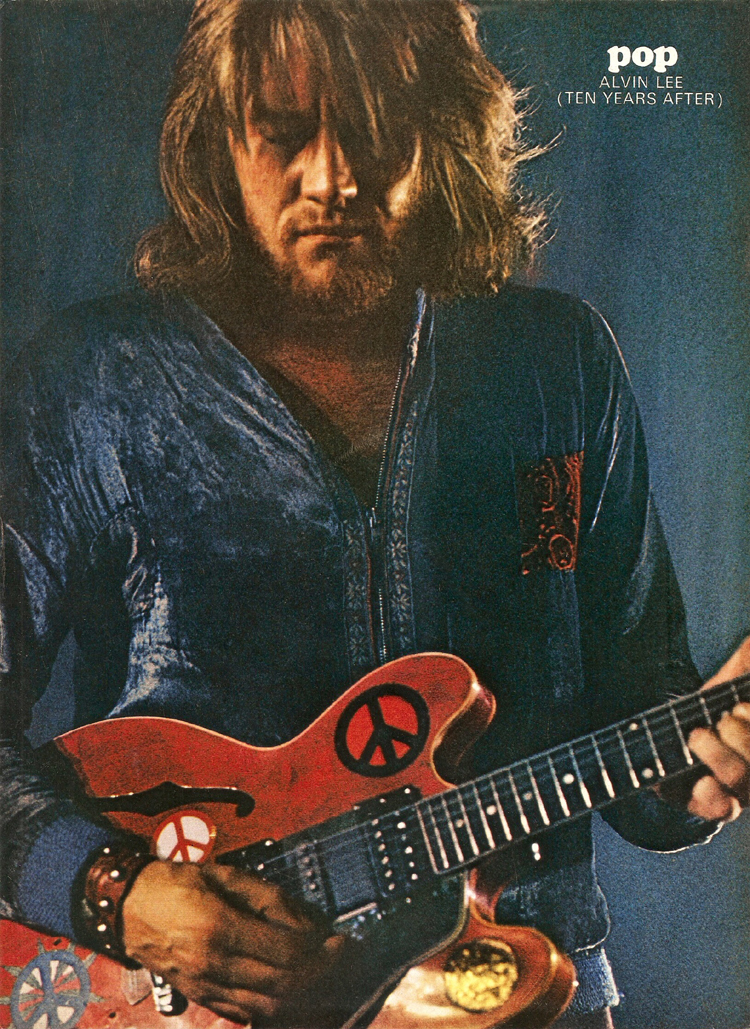
POP Magazine, No. 7, page 40
published in Germany and
Switzerland in July 1971 - (Photo
taken in March 1971)
- Contribution by Marcel Aeby
-
|
Beat Instrumental and
International Recording Studio
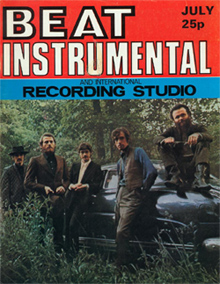
July
1971

Interview
with Ric Lee
When
a reporter manages to arrange an interview with Ten
Years After, he usually finds that they have just
returned from a trip to America. The interview with
Beat Instrumental was no exception. Drummer Ric Lee
described the latest visit as “pretty hectic tour
of one nighters.”
“We
were mainly at places we hadn’t played before.
Last time we were doing 18,000 seaters, but this
time there were only about 6,000. It’s not that
our popularity has declined there, but just that we
were playing at new places,” he said.
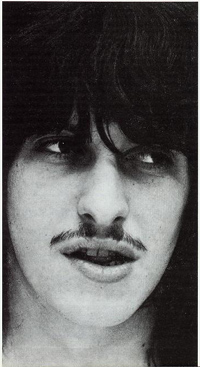 Ric
noted a change in American audiences, “They’re
getting younger. They seem to be twelve and thirteen
year olds. Maybe it’s the influence of the
Woodstock film, but before a good percentage of our
audience was a listening audience, but now we’ve
got the shouters back who spoil it for everyone. The
trouble is they all want to be part of the show.” Ric
noted a change in American audiences, “They’re
getting younger. They seem to be twelve and thirteen
year olds. Maybe it’s the influence of the
Woodstock film, but before a good percentage of our
audience was a listening audience, but now we’ve
got the shouters back who spoil it for everyone. The
trouble is they all want to be part of the show.”
“A
lot of groups are making political demands of the
audience. At Boston there were about 15,000 people
and two hundred cops. Some people rushed back stage
and were thrown out, so the singer of the other
group – who shall remain nameless (The Doors for
instance) started saying, “Don’t be pushed
around by the pigs!” “Let’s start it all right
here” and all that kind of thing. When we came on,
the audience were really hostile, and the police
insisted that the house lights be kept on. In fact
Alvin cooled the kids down and after we’d been
playing a while, they all went back to their seats
and the lights were turned off. I’ve always looked
on music concerts as something warm and friendly. We
go on to play music, not to stand and talk politics.”
Ten
Years After are now settling down to record their
first album since the expiration of the Decca
contract. The new album will be released through CBS
(Columbia Records) in America, but an English deal
has yet to be finalised. They are using Olympic’s
excellent small sixteen-track studio and are taking
a different approach from the one they’ve adopted
for their more recent albums, which for my money,
haven’t the drive and feel of their earlier
recordings, and don’t match the excitement of Ten
Years After on stage. “I like Cricklewood
Green,” commented Ric. “But I think at the time
of “Watt” we were in a bit of a vacuum. It’s
unfortunate, but you just go through these periods.
Before we’ve gone in and recorded stuff which
we’ve then tried out on stage. But that hasn’t
always worked. The number develops as you play it
live and people want to hear the developed version
on record. But now we’re recording some numbers
that we’ve used in Europe and America that we feel
have developed enough to record.” “We’re back
to where we were, doing live stuff and putting that
on record. But we will also be putting down some new
material that will no doubt develop later.”
“The
group is very together now in every way. It’s
really good. Rehearsals have been good, and we spend
more time discussing what we’re doing than
actually playing. We’re all going in the right
direction, and we all know what we want to do. Alvin
has written a lot of new numbers that are heavy, but
have got much more melodic content than some have
had.”
No
Split Up:
From
what Ric said, there seems to be a new breeze
blowing through the group, following some tense
incidents that took place at Montreux during their
spring tour of Europe, when the press suggested that
Ten Years After might split up. “No, there isn’t
any question of us splitting up,” said Ric quietly,
but emphatically. “I think Montreux got blown up
out of all proportion. We’ve had these sort rows
before, but the difference with this one was, that
there happened to be a reporter there, that’s all.
What happened at Montreux sorted things out and it
wasn’t what it was cracked up to be in the
press.” “We’ve been playing together as Ten
Years After for four years now and for a good while
before that too. When you have been playing together
that long you are bound to get silly differences
like at Montreux. The feeling there was to knock it
on the head because, basically, we couldn’t get
anything new out of it, although there were other
pressures as well.” “But you’ve got to learn
to overcome the pop business machine. You have to
pull yourself out of it and work constructively.
Then that striving for something comes out again,
and you think to yourselves, “Why should we be
stuck in a rut?” “I think we were losing sight
of each other as musicians and it took Montreux to
make us get out and get on with it and become
musicians again,” he added.
Breath
Of New Life:
As
well as being happy with the way things are going in
the group as a whole, Ric is also pleased with his
own playing at the moment. “I used to be a bit lax
about it, but I’m evolving new things. My solo is
getting a bit stale now. Some nights you get the
breath of new life and sometimes you don’t, but at
least I’m aware of it. By the end of the tour, it
was getting beter again I think.” But,
Ric is starting to work out a different solo to
replace the one he has become well known for, where
instead of the usual full-bore solo we get from most
drummers, he plays a tasteful and well-constructed
one. At one point everything goes quite, as Ric gets
right on top of the tom-tom, pressing it with his
knee. Ric, who plays Gretsch equipment exclusively,
uses two tom-toms – one tuned tightly like the
rest of his kit, and one slackened off. It’s the
one he uses virtually for the solo only, so he can
get variations of tone by applying pressure to it.
Like
most drummers, he is very critical of the sound he
gets on records. “We used to have great
difficulties recording the drums. We’d get a dead
sound and then spend hourd trying to get it right,
but it’s always difficult to pinpoint exactly what
you are looking for. I’ve been listening to a lot
of drums lately, and I like that echoey sound that
is like drums sounding in an empty hall, rather than
the tightly damped studio we’ve got in the past.”
About
Drums…
“A
lot of drummers have their skins flapping, which
carries well in a hall because the dull sound cuts
through the rest of the group on stage. A tuned kit
like mine doesn’t carry in the same way because
there is a ringing that carries on after the drum
has been struck, which gets lost in everyone
else’s sound.” “I like drums to have some note
or pitch which does make them difficult to record.
“I like the sound that jazz drummers often get on
record, but they play at a low volume which means
that mikes can be placed very close and there’s
not much juggling to do in the control room
afterwards. But with our sound, and with the force I
hit the drums, you’ve got to start from a
different concept of recording.”
Ric
is now teaching himself to play vibraphone, but he
won’t be using it publicly for a while yet. “I
think a knowledge of chords and so on will help me
understand the structure of the music so that I
don’t see it purely from a rhythmic point of view.
I think that will also increase my listening powers
because I tend to judge a record from the
drummer’s point of view, which comes from a lack
of understanding of other musical instruments.”
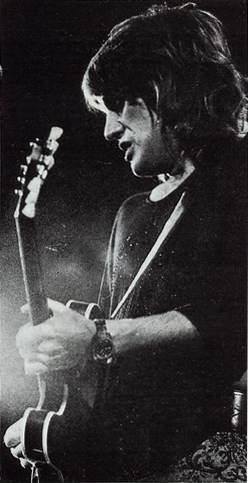
As
a last point, I asked Ric what was the motivation
for carrying on playing when your group gets to the
stage Ten Years After have reached, where there are
no apparent few new hurdles to jump, where you’ve
done more or less everything, in terms of live
concerts, international tours, and international hit
albums?
Never
The Same:
“I
think you’ve got to give your best every time you
play,” replied Ric. “If only from the point of
view of personal satisfaction. There is always
another hurdle to cross musically, and if you think
there isn’t, you’re kidding yourself. You just
can’t rest on your laurels if you are a
conscientious musician. Sometimes the music can get
mechanical, but there’s always the urge to get out
of it again. We’ve been doing “Love Like A
Man” for over a year now, but it’s never played
the same, and I couldn’t tell you what I play.
It’s always slightly different, but that’s not a
conscious thing, because you can never repeat that
point in time when you are actually creating
something, however much you try.”
And,
how long can Ten Years After carry on getting
something more out of their music?
“If
you’re prepared to be happy with your playing, and
let it go at that, then your career is bound to be
short. But I think it’s never finished, if you are
conscientious, and keep on trying to do something
better. No one in the band has got the desire to
switch off now. It will come to the point where we
all do individual things, but how far away that is,
I couldn’t say.”
|

New Musical
Express July 31, 1971
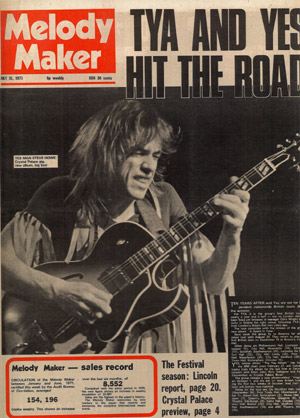
Melody
Maker Magazine – July 31, 1971
“Ten
Years After” and „Yes“ Hit The Road
U.S.A.
Thirty Cents
Ten
Years After and Yes are set for independent nationwide
British tours during the autumn.
For
Ten Years After, it is the group’s first British
tour for nearly a year and a half – but no London
date has been fixed yet because of manager Chris
Wright’s difficulty in finding the right venue,
following Ten Years After’s ban from London’s
Albert Hall two years ago.
The
tour coincides with the release of the group’s new
album “A Space In Time”.
Next
week the group fly to America for another major tour
until August 29th. They return to play
their first British date on September 14th
at Bristol’s Colston Hall. Other dates are
Philharmonic Hall, Liverpool (September 15th),
City Hall Newcastle (16th), Edinburgh (17th)
Guild Hall Southampton (20th) Leicester De
Montfort Hall (22nd) City Hall Leeds (25th)
Free Trade Hall Manchester (26th) City Hall
Sheffield (28th) and Town Hall Birmingham (October
14th).
YES,
whose album “The Yes Album” has been in the Melody
Maker chart since February 27th, will
feature the tracks from the album for the last time at
Saturday’s concert with Elton John, Rory Gallagher
and Fairport Convention at Crystal Palace Bowl. The
group release a new album – titled “Fragile” on
October 1st and are set for their British
tour during the first two weeks of October. And their
repertoire will feature new material.
Dates
for the tour are: De Montfort Hall Leicester
(September 30th) Free Trade Hall Manchester
(October 1st) Albert Hall Nottingham (2nd)
Music Hall Aberdeen (7th) Queen’s
Playhouse Glasgow (8th) Empire Theatre
Edinburgh (9th) Caird Hall Dundee (10th)
Colston Hall Bristol (12th) City Hall
Sheffield (13th) City Hall Southampton (14th)
and ABC Theatre, Stockton (15th)
|
|